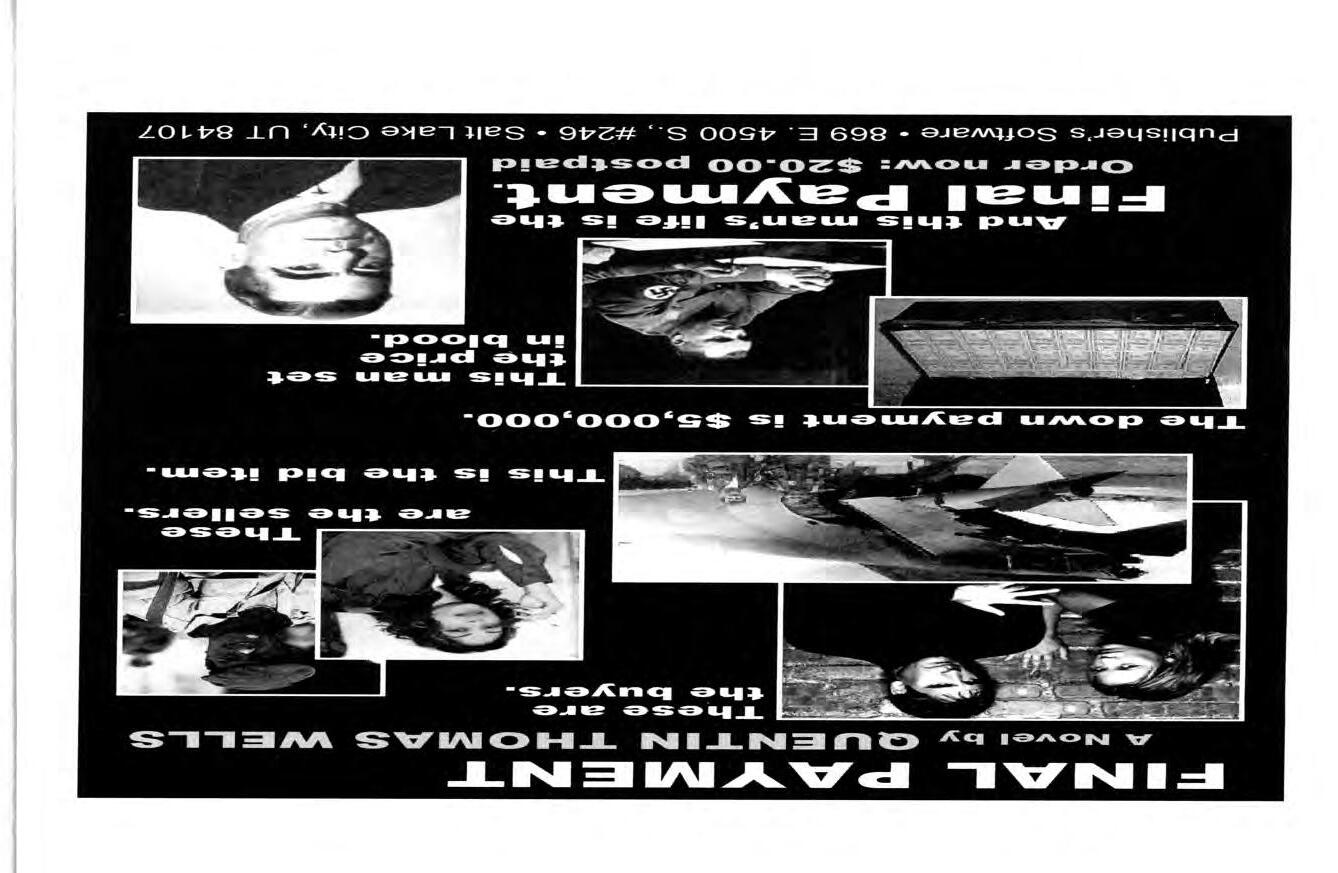

Folio A Literary Magazine

Editor:
Stefanie Cosman
Assistant Editor: Aimee O'Brien
Professional Advisor:
Nicole Stansbury
Writing Center Liaison:
Clint Gardner
Faculty Advisor:
David Susman
Cover Art: "CEO" by Jessica Bailey
Support provided by the Student Media Council at Salt Lake Community College.
Salt Lake Community College (SLCC) is not responsible for the opinions expressed in Folio, nor do the pieces represent any official position at Salt Lake Community College. Individual authors are solely responsible for the opinions expressed herein.
Each author retains copyright individually.
Folio A Literary Magazine Salt Lake Community College Volume 5 Number 1 Spring2003

Submissions:
Folio publishes fiction, poetry, drama, essays and art. Submissions are accepted yearround, and may be sent via e-mail or delivered in hard copy.
Send e-mail submissions, in Word format, to David Susman, Associate Professor of English, at David.Susman@slcc.edu.
Deliver hard-copy submissions to Clint Gardner, Director, SLCC Writing Center, AD 218, or use the Folio Submission box in AD 218. You may also deliver to David Susman in AD 149. Copies only; send no originals. Work can be returned only if accompanied by a self-addressed, stamped envelope.
Editorial Contacts:
Clint Gardner 957-4893
David Susman 957-4835

Forethought A Thought Shaun Spalding ............................................................................................ 13 December Roses Aaron D. Craner 16 The Circling Within Jhon,ry &yale ............................................................................... 18 Epilogue Stefanie Cosman ............................................................................................... 1 9 On Love & Relationships ''True Love"- Is it real or is it Hollywood? Stefanie Cosman 23 Of Lizards and Literature Zachary Todd ................................................................... 28 A Cold New Day &dnry Wardle .................................................................................. 31 Memory Grove and Joshua April Olmos 38 Silent Love Shaun Spalding ............................................................................................ 39 The Gift Of Disability Aimee O'Brien 40 The Last Chris Evans ..................................................................................................... 42 Reflections Picture from the Hubble Space Telescope Brandon D. Alva .................................. 54 Revelations and Revolutions Jen Walters .................................................................... 5 9 It's Called a "Generation Gap" Amanda Kesler ......................................................... 63 Locked James Bodden ...................................................................................................... 6 9 Earth College Crystal Lowder ........................................................................................ 7 4 Jumping the Shot-Gun Susanne Ostler ......................................................................... 77 For the Dreamer Starry Night Aimee O'Brien ........................................................................................... 87 Garden Walk Mark Curtis ............................................................................................. 8 8 Learn by Heart Stefanie Cosman 91

Visual Art Untitled Shaun Spalding ............................................................................. 15 Tupac in Charcoal Darren Ottley 17 Standing In Line Jeremy West ..................................................................... 27 Undercover Kitty Rebecca Stuhjf. .............................................................. 37 Untitled Bruce W. Larsen 53 Untitled Nathan Stoker.............................................................................. 58 Untitled Ali Jones 68 Star Gazing Rebecca Stuhff. ...................................................................... 73 Untitled Grant Sperry ................................................................................. 84 Blissful Picnic Mark Bragdon ..................................................................... 90
Note from the Editors

When we were first asked to work for Folio magazine, we found a publication that began as a showcase for writings done in classes at Salt Lake Community College. At first, the publication consisted mostly of essays written in the English 1010 and 2010 classes, but as the editions continued the scope of the magazine expanded. As Editors, we were given the task of taking Folio as it was, putting our own fingerprints on it and taking it in a new direction.
The hardest thing about publishing this literary magazine was deciding what the general feel of the publication will be, and what pieces to publish. We spent a great deal of time filtering through many excellent pieces submitted by the students at Salt Lake Community College. We were amazed at the ideas and knowledge expressed in all of the submissions, and in the end we are very pleased with the pieces that appear in this current edition of Folio.
We strayed away from the strict formalities of the usual literary magazine. Our goal was to create a professional magazine, but to also maintain the sense of humanity and creative expression that these artists so diligently articulated. We feel this edition is not only relevant to the times, but additionally gives insight into topics that seem to be timeless and valuable to everyone.
Our hope is that through Folio, we have created a suitable environment for the thoughts recorded within, and better still, generated thoughts within you.
Stefanie Cosman
Aimee O'Brien
Forethought

Surely there is grandeur in knowing that in the realm of thought, at least, you are without a chain; that you have the right to explore all heights and depths; that there are no walls nor fences, nor prohibitedplaces, nor sacred corners in all the vast expanse ofthought...
-Robert Green Ingersoll
A Thought
Shaun Spalding

I don't know what I really expected life to be ...
Gazing out through a small window of the desert, I see castles towers beaches pyramids
Such a sight brings forth visions
A ring of dolphins in a blue sapphire sea. A girl in pigtails that made me smile.
But all these are gone now. Only colored dust in my hands.
I go and stand on a bridge of lights. Look out upon this night of color.
Strange shadows move past, figures entwined. I am the only one alone here.
However I do remember things ...
Crystalline beings standing guard.
Conversations erupting from traffic.
None of it matters though.
With no one here to share my memories, they don't last anyway.
I only have one hope.
Folio 13

That maybe, just maybe ...
Some entity on the other side will put her arms around me.
Hold me and let my tears fall to the ground.
(A small reflecting pool around our feet)
Put her shadowed lips to my ear and say,
"Let's rest awhile. It was a very strange ride."
Folio 14
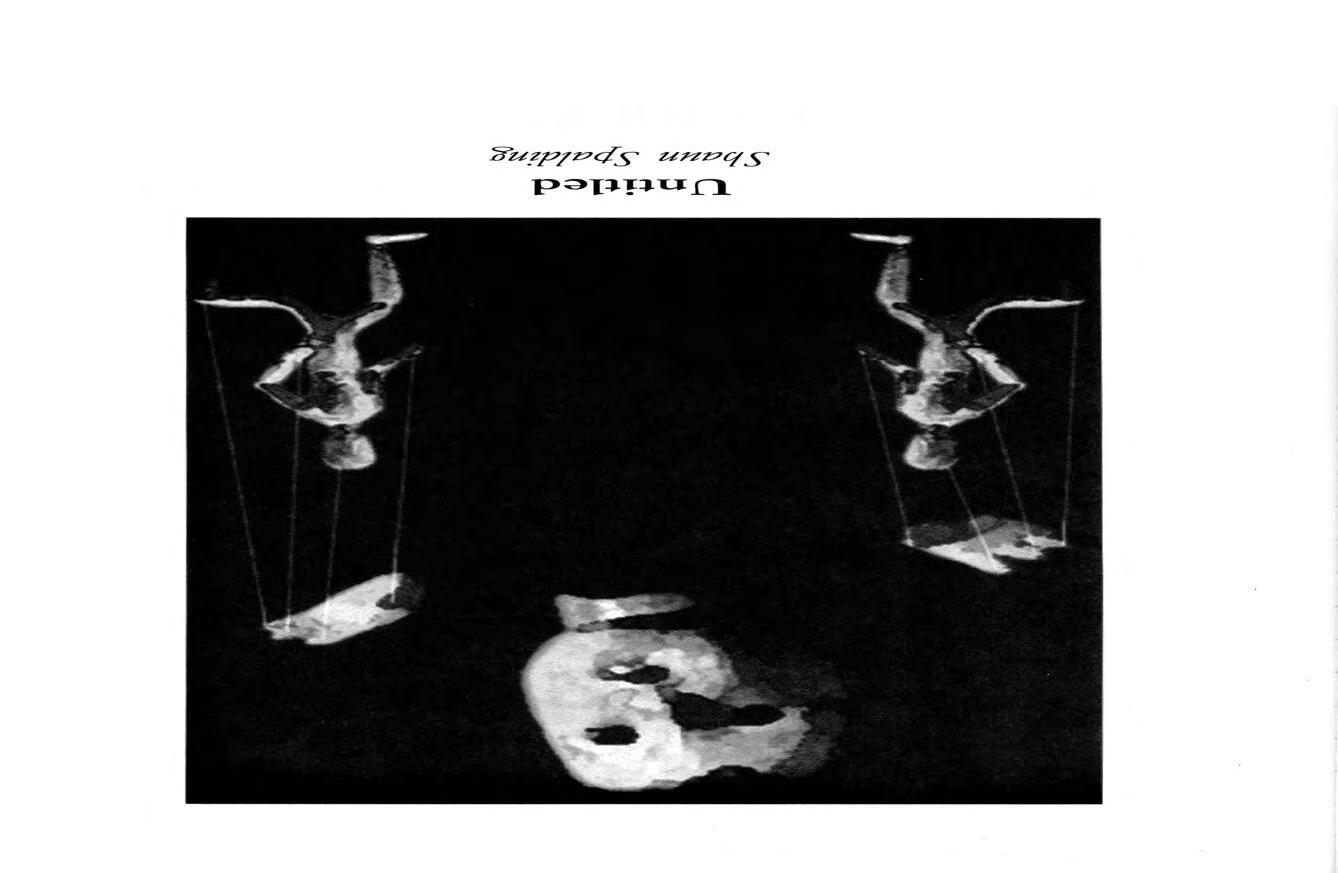
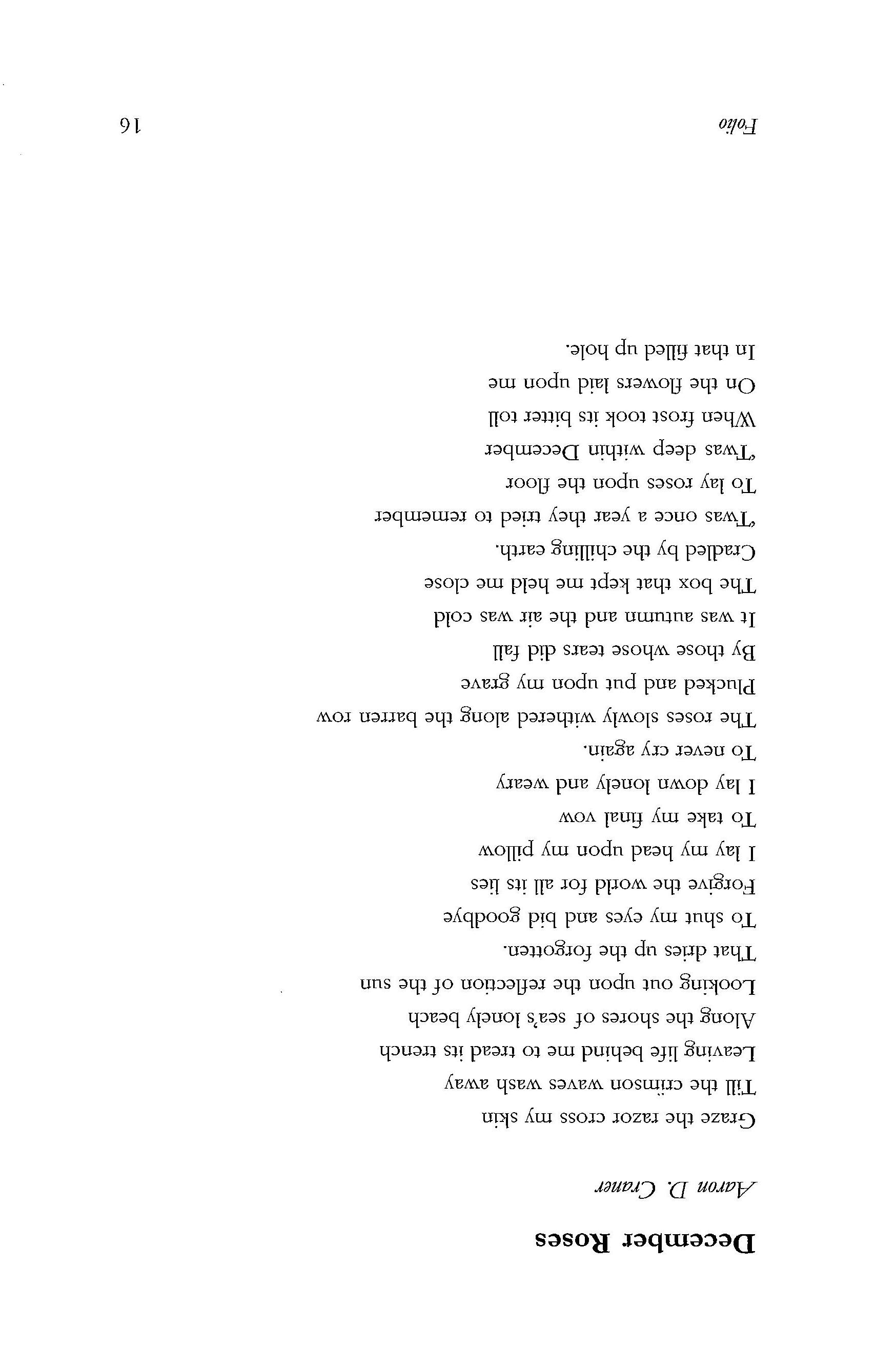
December Roses
Aaron D. Craner
Graze the razor cross my skin
Till the crimson waves wash away
Leaving life behind me to tread its trench
Along the shores of sea's lonely beach
Looking out upon the reflection of the sun
That dries up the forgotten.
To shut my eyes and bid goodbye
Forgive the world for all its lies
I lay my head upon my pillow
To take my final vow
I lay down lonely and weary
To never cry again.
The roses slowly withered along the barren row
Plucked and put upon my grave
By those whose tears did fall
It was autumn and the air was cold
The box that kept me held me close
Cradled by the chilling earth.
'Twas once a year they tried to remember
To lay roses upon the floor
'Twas deep within December
When frost took its bitter toll
On the flowers laid upon me
In that filled up hole.
Folio 16


The Circling Within
Jhonf!)I Rqyale
Color empty complicated
This was never meant for me
Center weakens obligations
Leaving a trail of destiny
Caution breaker willfully
Dreaming keeps my sanity
Spirit broken desperately
The end is near undoubtedly
18
Folio
Epilogue
Stefanie Cosman

When the song has been written
The day is painted black
And the right moment came
But was shadowed by doubt
When our dance is over
I'm left standing alone
That's when I'll want to go back
When a new day has come
And there's no turning back
All is starlight and questions
Unanswered eternal forever to be asked
When those times have vanished
And our song is done
That's when I'll want to go back
Folio 19
On Love & Relationships

Do you want me to tell you something really subversive? Love is everything it's cracked up to be. That's why people are so cynical about it. It really is worth fighting for, being brave for, risking everything for. And the trouble is, ifyou don't risk anything, you risk even more.
-Erica jong
r
"True Love"- Is it real or is it Hollywood?
S tejanie Cosman

Two eleven-:Jear-old girls lie on their stomachs in a cluttered living room. There is not a male presence within sight, or for that matter, within bearing distance. The girls' bands support their mesmerized, tear-streaked faces as tbry gaze at the doomed lovers on the TV screen.
Rose: I love you, Jack.
Jack: Don'tyou do that, don't you sqy your good-l?Jes. Not yet.
Rose: I'm so cold.
Jack: .. you must do me this honor. Promise meyou will survive. Thatyou will never give up... no matter what happens... no matter bow hopeless. Promise me now, and never let go of that promise.
Rose: I promise.
Jack: Never let go.
Rose: UI never let go, Jack. HI never let go.
It is a bunch of money making romantic muck, pulling young girls such as these powerless and vulnerable victims into its infinite abyss. They will go on to watch Titanic an additional fifteen times, buy the entire collection of Leonardo DiCaprio posters, and memorize the lyrics to the ballad, "My Heart Will Go On" made popular by the film's massive success. Not only will they buy the first soundtrack they will also buy the second soundtrack. No keepsake that signifies the fi]m shall be passed up.
And these "victims" love every minute of it.
That is the story of romance today. Glitter, tragedy, and unparalleled passion is the name of the game. Young girls look to Hollywood to show them what love is, who/what type of person to love, and more importantly how and where to find love. Most girls have their wedding planned ten years before it is even going to happen. The fact that they need to be engaged before they can pick out an engagement ring or wedding colors doesn't matter, it is a mere technicality to them. Teenagers flock to N'Sync and Britney Spears concerts by the droves, singing along with every word of endless deluges of love. songs. They prove once again what is already obvious-that this romance stuff sells. During these years of "castle in the sky" adolescence, we are
Folio 23

hopelessly suspended in a world of teen idols and romantic daydreaming. The true definition of reality is shattered by temporary lunacy. When I was about eleven years old, I had a good friend with whom I spent most of my early teenage years with. We frequented malls, spent hours on the phone, wasted money on clothes as most teenage girls do ... and watched romantic movies repeatedly. Although this took up a considerable amount of time, somehow we managed to find time to make certain predictions/ strategies about our future. I guess we believed that if we planned things sufficiently ahead of time we would be safe and fate could only work for us, not against us. Most of these pre-planned avenues (no surprise here) had to do with drum roll guys! Among the items on our expansive list were:
"I'm going to marry John" (one of my friend's teenage crushes).
"I'm going to wear so-and-so gown to the senior prom."
"The first guy I kiss will be the man I marry."
I can't tell you with certainty about the first one yet since neither of us are married (and as my mom says, ''You're not married 'til you're married." Maybe this John guy from our junior high years is still waiting in the wings.) On the other hand, I can definitely tell you that our dream prom dresses at age eleven were not our dream dresses at age seventeen, so our attire was entirely different from that we had pictured at the dreamy age of eleven when we thought we knew everything. And as for that last order of business about kissing? It flew out the window committing romantic suicide shortly after this "sacred" declaration of ours was created. So much for "first kisses" at the altar. Now, at the "stabilized" age of eighteen, I can't say that any of these idealistic love fantasies have really been out-grown, either by me, or my friends from that era. We still fantasize about our Romeos, we still think that nobody can compare to the charm and magnetism of Richard Gere in First Knight. We all want to be kissed the way Lancelot kisses Guinevere in the climactic love scene from the film. None of these ambitions have changed, and they probably never will, even after we have celebrated our 30 th wedding anniversaries.
Still, we are not the same as the eleven-year-old versions of ourselves. We are now more accepting of the realities of life. We have come to realize through certain "rites of passage" that, there is a difference between loving the idea of romance, and actually feeling the truth of real love.
Folio 24
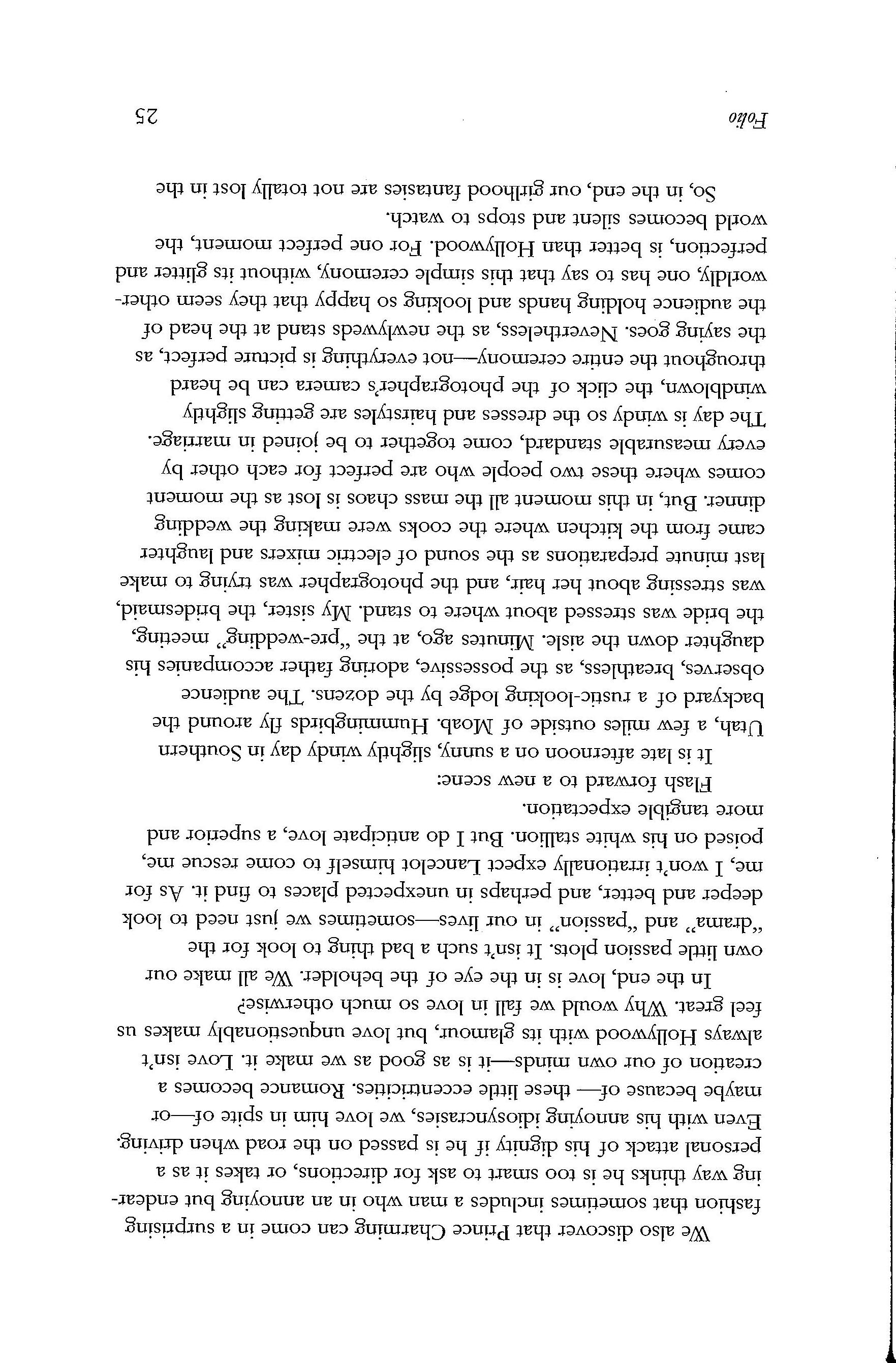
We also discover that Prince Charming can come in a surprising fashion that sometimes includes a man who in an annoying but endearing way thinks he is too smart to ask for directions, or takes it as a personal attack of his dignity if he is passed on the road when driving. Even with his annoying idiosyncrasies, we love him in spite of--or maybe because of- these little eccentricities. Romance becomes a creation of our own minds-it is as good as we make it. Love isn't always Hollywood with its glamour, but love unquestionably makes us feel great. Why would we fall in love so much otherwise?
In the end, love is in the eye of the beholder. We all make our own little passion plots. It isn't such a bad thing to look for the "drama" and "passion" in our lives-sometimes we just need to look deeper and better, and perhaps in unexpected places to find it. As for me, I won't irrationally expect Lancelot himself to come rescue me, poised on his white stallion. But I do anticipate love, a superior and more tangible expectation.
Flash forward to a new scene:
It is late afternoon on a sunny, slightly windy day in Southern Utah, a few miles outside of Moab. Hummingbirds fly around the backyard of a rustic-looking lodge by the dozens. The audience observes, breathless, as the possessive, adoring father accompanies his daughter down the aisle. Minutes ago, at the "pre-wedding'' meeting, the bride was stressed about where to stand. My sister, the bridesmaid, was stressing about her hair, and the photographer was trying to make last minute preparations as the sound of electric mixers and laughter came from the kitchen where the cooks were making the wedding dinner. But, in this moment all the mass chaos is lost as the moment comes where these two people who are perfect for each other by every measurable standard, come together to be joined in marriage. The day is windy so the dresses and hairstyles are getting slightly windblown, the click of the photographer's camera can be heard throughout the entire ceremony-not everything is picture perfect, as the saying goes. Nevertheless, as the newlyweds stand at the head of the audience holding hands and looking so happy that they seem otherworldly, one has to say that this simple ceremony, without its glitter and perfection, is better than Hollywood. For one perfect moment, the world becomes silent and stops to watch.
So, in the end, our girlhood fantasies are not totally lost in the
Folio 25

chaos and confusion of reality. Love really does exist, and we really do have our storybook loves/weddings. So the eleven-year-old in me feels justified in saying that I want to get married by a beautiful waterfall in Hawaii, with a lot of tiki torches around, and the strings of soft guitar music playing softly in the background. Anything can happen, right?
26
Folio
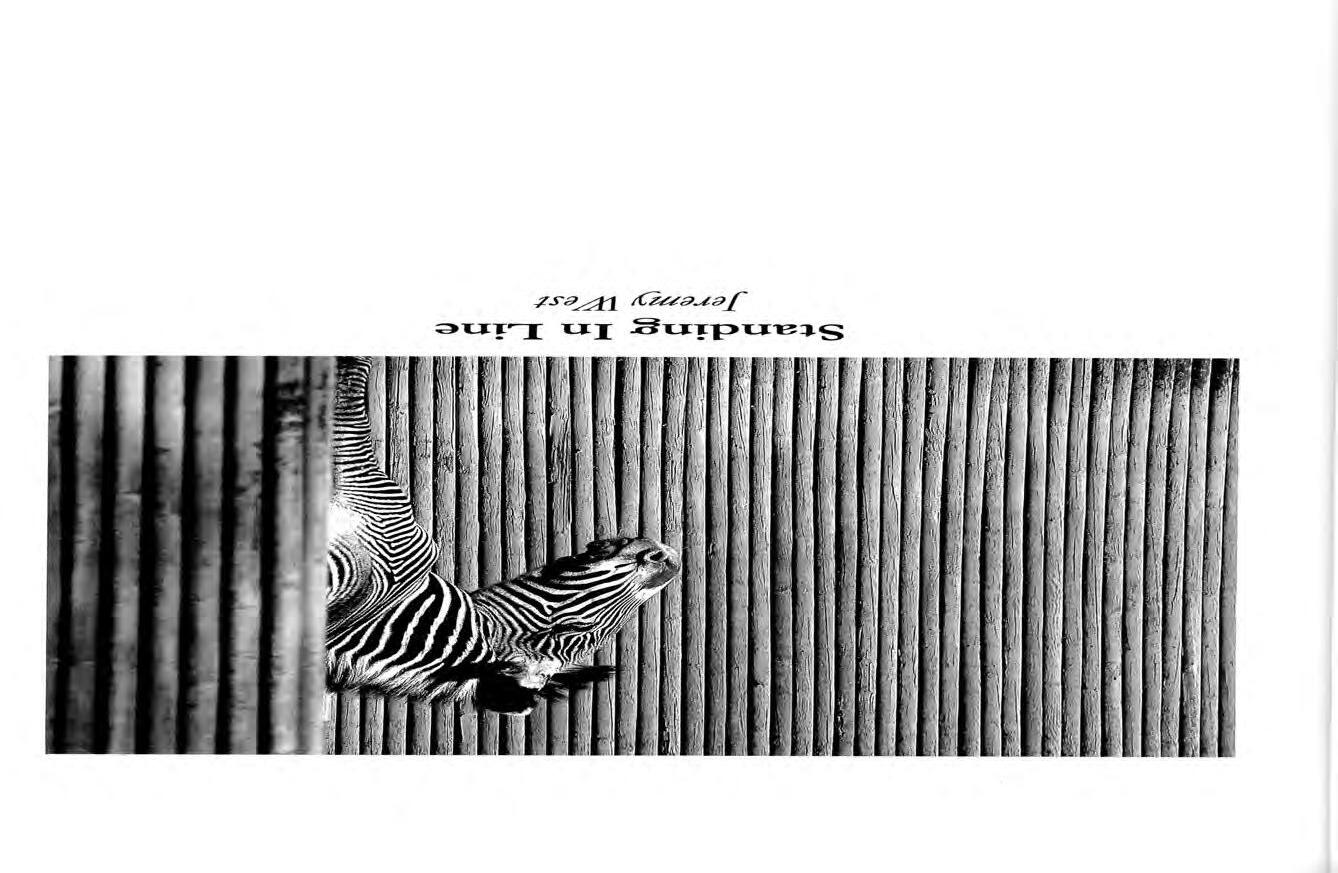
Of Lizards and Literature
Zachary Todd

I once had an iguana that I loved. Her name was Reggie, a terrible name for a female lizard, but when I first met her I was sure she was male. Like most iguanas, Reggie was long and green, and most of her length was in her brown-striped tail which sprung back wickedly each time my tender face came near her glass cage. In her cage, Reggie was Godzilla's sister. Out of it, she was as pleasant and amiable as a well-fed baby. It was then that she would climb up my arm to the top of my head, and perch like a rooster on a rickety fence. There, she would use her tail to keep balance and thus survey her kingdom with amber, reptilian eyes.
Reggie was a vegetarian. Each day I would prepare a fabulous salad for her, made from a variety of leafy greens and fruits I would collect from the produce section of a nearby supermarket. I was surely an odd sight with my kale, collard greens, mustard greens, spinach leaves, sprouts, red-leafed lettuce, and papaya. At the checkout line, it was normal to get strange looks from the cashier and suspicious glances from folks in the line behind me. I would always wait eagerly for any of them to ask or comment about my assortment of foliage. If they did, I would pounce to tell them about my dear lizard and her wonderful eating habits. Sometimes, my replies were met with disbelief and even silence. But nonetheless, it was deeply satisfying; I had a pet dragon.
My life with Reggie was one of leisure and learning. She was a noble reptile, capable of thrilling children and adults alike. And though I didn't care to shock people with her, she occasionally did very shocking things. Like the time she relieved herself unexpectedly on my mother's white couch while my grandmother and aunt watched in horror (iguana droppings are particularly messy and disturbing). My mother, who was holding Reggie at the time, didn't appreciate the stunt, and to this day I still hear about it anytime lizards come up in conversation. But Reggie didn't bark, and Reggie didn't bite, and her beautiful scales and comely spikes were a source of constant inspiration. She was my little dinosaur-quiet and armored much like I was.
Folio 28
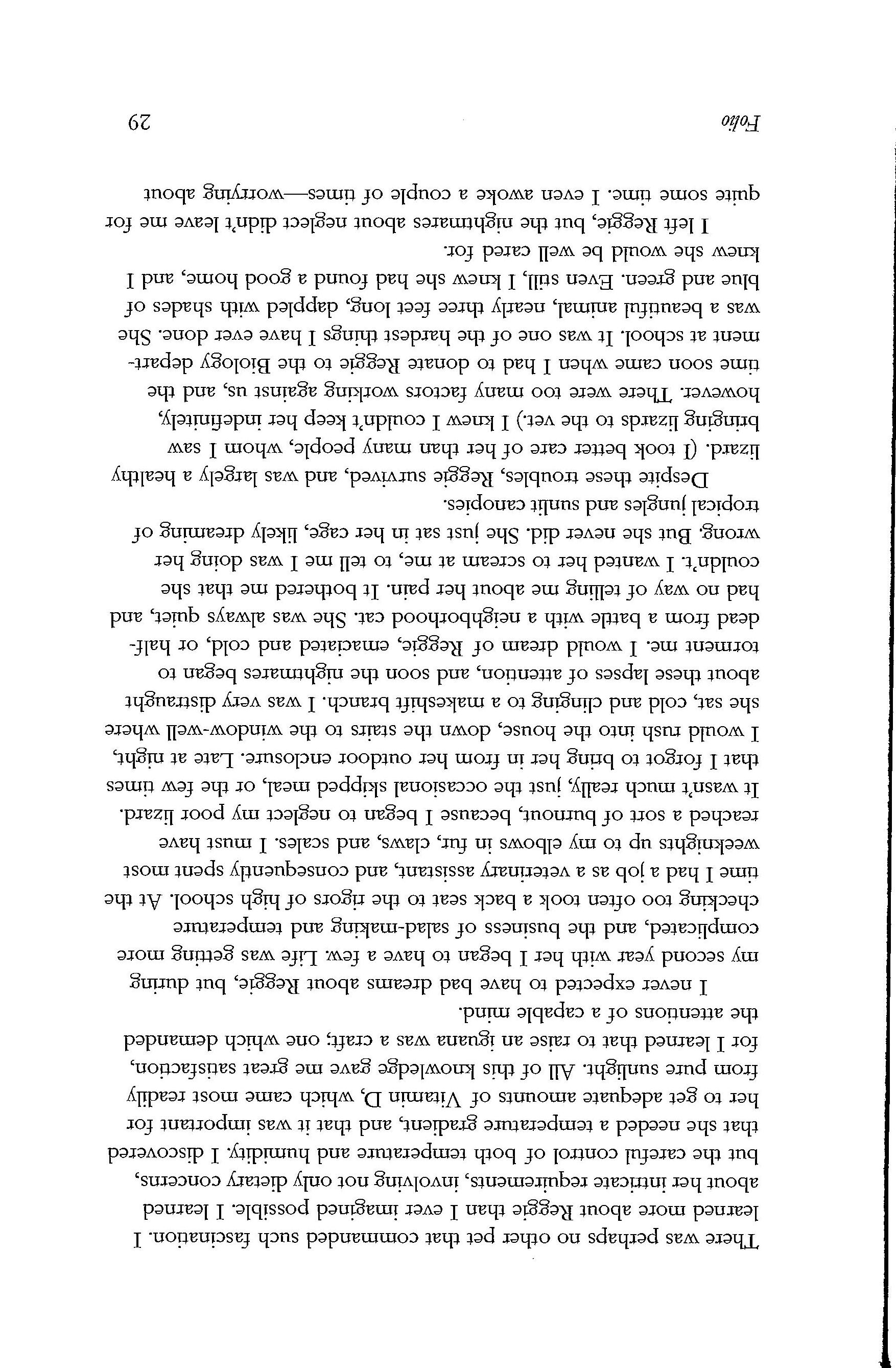
There was perhaps no other pet that commanded such fascination. I learned more about Reggie than I ever imagined possible. I learned about her intricate requirements, involving not only dietary concerns, but the careful control of both temperature and humidity. I discovered that she needed a temperature gradient, and that it was important for her to get adequate amounts of Vitamin D, which came most readily from pure sunlight. All of this knowledge gave me great satisfaction, for I learned that to raise an iguana was a craft; one which demanded the attentions of a capable mind.
I never expected to have bad dreams about Reggie, but during my second year with her I began to have a few. Life was getting more complicated, and the business of salad-making and temperature checking too often took a back seat to the rigors of high school. At the time I had a job as a veterinary assistant, and consequently spent most weeknights up to my elbows in fur, claws, and scales. I must have reached a sort of burnout, because I began to neglect my poor lizard. It wasn't much really, just the occasional skipped meal, or the few times that I forgot to bring her in from her outdoor enclosure. Late at night, I would rush into the house, down the stairs to the window-well where she sat, cold and clinging to a makeshift branch. I was very distraught about these lapses of attention, and soon the nightmares began to torment me. I would dream of Reggie, emaciated and cold, or halfdead from a battle with a neighborhood cat. She was always quiet, and had no way of telling me about her pain. It bothered me that she couldn't. I wanted her to scream at me, to tell me I was doing her wrong. But she never did. She just sat in her cage, likely dreaming of tropical jungles and sunlit canopies.
Despite these troubles, Reggie survived, and was largely a healthy lizard. (I took better care of her than many people, whom I saw bringing lizards to the vet.) I knew I couldn't keep her indefinitely, however. There were too many factors working against us, and the time soon came when I had to donate Reggie to the Biology department at school. It was one of the hardest things I have ever done. She was a beautiful animal, nearly three feet long, dappled with shades of blue and green. Even still, I knew she had found a good home, and I knew she would be well cared for.
I left Reggie, but the nightmares about neglect didn't leave me for quite some time. I even awoke a couple of times-worrying about
Folio 29

her-long after she was gone. The thought of being a negligent pet owner, was a dreaded one. It filled me with loathing so much, that I once checked the shelf in the middle of the night where her glass cage had been, just to make sure she wasn't still there-cold and hungry.
I remember these seemingly silly times, not because I'm necessarily concerned about the neglect of pets, but because I have had similar thoughts about the neglect of writing. The relationship with writing can be at times a fascinating journey replete with beautiful insights and unforgettable scenery. Writing can teach and, at the height of its worth, the craft can be a prized possession. But if one is not careful, the neglected craft can become a source of despair. My writing never screams when I leave it alone too long. It never barks when it's hungry. The pen can lay cold for weeks, and the page never knows the difference between being covered with ink, or being left naked and blank. Ultimately I must remember to nourish it. I must remember to keep it warm.
Folio 30
A Cold New Day
Rndney Wardle

I glanced at the only light in the darkened room. The red clock light, while soothing to fall asleep to, was awfully bright and hard to ignore when coupled with the startling noise of the alarm early in the morning. My sleepy eyes started to focus in on the almost blinding light. It faintly looked like 5:30 a.m. but that was way too early in the morning to wake up. Unfortunately, that was how early I woke up every school day.
"Oh man, it's cold today ... maybe school is cancelled," I thought to myself as my little body rested warmly between the covers of my bed. Even at this early age of ten, I had hated the winter. I especially hated it in the early morning, when the chilly air seemed to reach every corner of our poorly heated duplex. It was relentless in the mornings. The only thing that slowed it down was the old, thick blankets we would sleep with, like a buckler against a battering ram.
I attempted to reach my nightstand to turn off my alarm. Adjusting my body, I stretched my arm out to destroy one of my morning foes. At the very moment I attempted to move my legs, I was struck with what I call "the morning chill." This is when an extremity that has been warmed overnight by the blankets touches a chilly spot on the sheets. My choice was to stay in my warm bed, rather than face a cold new day.
My room was suddenly flooded with light, the door was open, and my eyes were the recipients of this torture. "Rodney it's time to wake up," was the voice I heard in the midst of the light. "O.K.," I responded. I rolled out of bed into the new, cold day. There was no use in trying to fight the light or the sleep because I had battled them enough mornings to know that I never won.
The strange thing is that my grandma had already been up for about an hour getting ready for work. Her face always looked awake in the mornings, but not in the way most people would define awake. It was a face that had been woken up too early, too many times. It was a face that had grown used to working hard caring for the disabled elderly during the day, going to bed at night, and waking up
Folio 31

extremely early in the morning only to do it again the next day.
This morning was just the same as all the other mornings of my childhood: waking up, bathing, and some cartoons. Occasionally there was a (what I esteemed "gourmet") Pop-Tart or an Eggo Waffle waiting for me, but usually it was cold cereal or toast. By the time I was done eating and preparing, my grandma was sitting at the kitchen table. I could always find her there drinking her morning cup of coffee and smoking a cigarette.
Around 6:15 there came a distant honk from the street north of our duplex.
"O.K. Rodney it's time to go to Art and Media's house. I'll be back at around 5:30. There's Ramen noodles in the cupboard and pizza in the fridge when you get hungry."
I walked to the side-door and gave my grandma a hug and a kiss. We exchanged "I love you's" as we both stepped outside into a cold winter morning. My grandma walked along the side of the house, past the house in front of ours, and up to the street where her ride was waiting. I walked down a path between our neighbor's fence and our side-porch. The fence separated our neighbor's backyard/ parking lot and our humble little home.
Years ago I had made a hole at the top of this wooden fence, so it was easier to climb over. My friends and I used this fence frequently. I usually enjoyed climbing over this, but the winter often prevented me from enjoying most things.
"Why can't Grandma have a car? It would be so much easier to get to school and back. I wouldn't have to go to stupid Art and Merlia's in the morning to get a ride to school. I wouldn't have to walk home either. We wouldn't have to get rides from them everywhere we go. Best of all I wouldn't have to walk to the store every day! It would be nice to be like everyone else."
My tired and cold frame arrived at the doorstep of our Westward neighbors, Art and Merlia. I rang the aging doorbell cautiously, seeing as it was only 6:30 in the morning. Only crazy people were up that early. Being greeted by an aging, heavyset woman in a robe I entered the old house. "Hi, come on in," were her words, but the voice and body movement said something like, "I am really tired and old, I want to go back to bed." She let me in and climbed up the steep staircase to her bedroom. This was the time they usually woke up
Folio 32
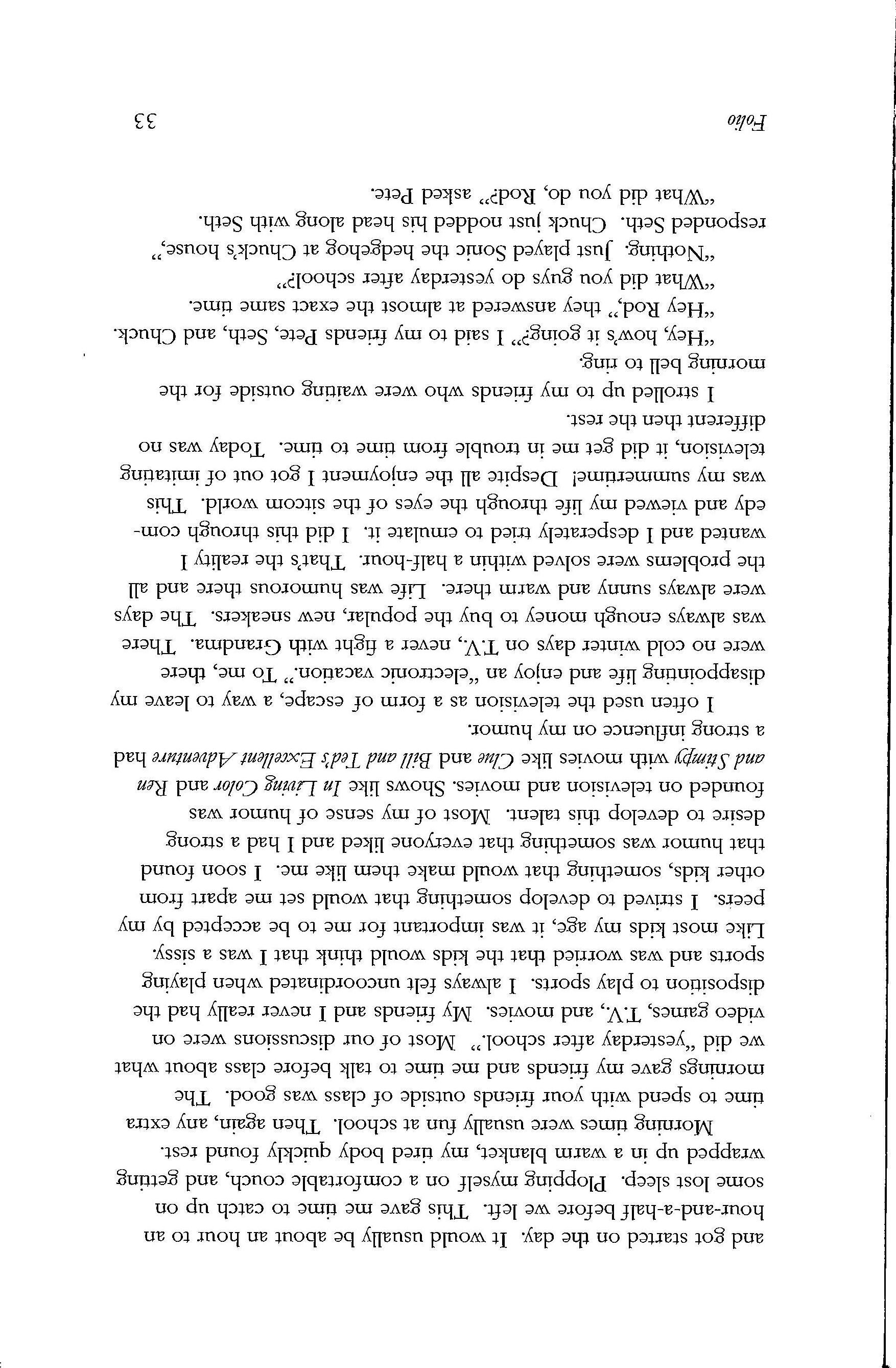
and got started on the day. It would usually be about an hour to an hour-and-a-half before we left. This gave me time to catch up on some lost sleep. Plopping myself on a comfortable couch, and getting wrapped up in a warm blanket, my tired body quickly found rest. Morning times were usually fun at school. Then again, any extra time to spend with your friends outside of class was good. The mornings gave my friends and me time to talk before class about what we did "yesterday after school." Most of our discussions were on video games, T.V., and movies. My friends and I never really had the disposition to play sports. I always felt uncoordinated when playing sports and was worried that the kids would think that I was a sissy. Like most kids my age, it was important for me to be accepted by my peers. I strived to develop something that would set me apart from other kids, something that would make them like me. I soon found that humor was something that everyone liked and I had a strong desire to develop this talent. Most of my sense of humor was founded on television and movies. Shows like In Living Color and Ren and Stimpy with movies like Clue and Bill and Ted's Excellent Adventure had a strong influence on my humor.
I often used the television as a form of escape, a way to leave my disappointing life and enjoy an "electronic vacation." To me, there were no cold winter days on T.V., never a fight with Grandma. There was always enough money to buy the popular, new sneakers. The days were always sunny and warm there. Life was humorous there and all the problems were solved within a half-hour. That's the reality I wanted and I desperately tried to emulate it. I did this through comedy and viewed my life through the eyes of the sitcom world. This was my summertime! Despite all the enjoyment I got out of imitating television, it did get me in trouble from time to time. Today was no different then the rest.
I strolled up to my friends who were waiting outside for the morning bell to ring.
"Hey, how's it going?" I said to my friends Pete, Seth, and Chuck.
"Hey Rod," they answered at almost the exact same time.
"What did you guys do yesterday after school?"
"Nothing. Just played Sonic the hedgehog at Chuck's house," responded Seth. Chuck just nodded his head along with Seth.
''What did you do, Rod?" asked Pete.
Folio 33

"Nothing, just watched some T.V. Have you ever seen the movie, A Christmas Story?"
''Yeah, that's a funny movie!" Smiles and grins accompanied the enthusiastic comment.
"'You'll shoot your eye out kid.' I love that part!" Chuck said. We exchanged movie quotes for a minute or two then I said:
''You know the part where Ralphy triple-dog-dares his friend to stick his tongue to the flagpole? Does that really work?"
"I think so," responded Pete.
"Really? I don't think so!" I fired back.
''Well if you're so smart, why don't you try it?" exclaimed Seth.
"Fine, I will," I said with confidence.
I knelt down on the cold, frozen concrete next to a pole that connected two sides of a chain-linked fence. My knees were soaking , up the newly fallen snowflakes as I gently pressed my tongue to the fence. I waited for about five seconds to see if my tongue would stick. At first it didn't really feel like anything was happening and was confident that my friends would be feeling foolish that they doubted me.
"Thsee guyths I ptold you that...." pulling my head back and tried to free my tongue from the flagpole but I was stopped. My tongue was stuck! I couldn't believe it! It wasn't even that cold! What was I supposed to do now?
"Hey guyths help!" I frantically mumbled.
"Uhhh ... why don't you just pull it off?" asked a confused looking Seth.
A small crowd of children quickly gathered to gander at this peculiar event. Their whispers seemed like shouts, as I desperately tried to figure out what to do, when abruptly the school bell signaled for class to start. The crowd seemed to disappear as quickly as it came and I was left alone.
''Well I am not going to end up like Ralphy's friend," I thought to myself. "It's just like a loose tooth: if I yank it hard and fast enough it will come off without any pain," I rationalized. I dosed my eyes and mentally braced myself for any unexpected pain. I sharply jerked my head back, grabbed my backpack, and ran for class. The metallic taste of blood filled my mouth as I hurried to my first class. Everyone in the hall seemed to stare at me as I walked to class. This, combined
Folio 34
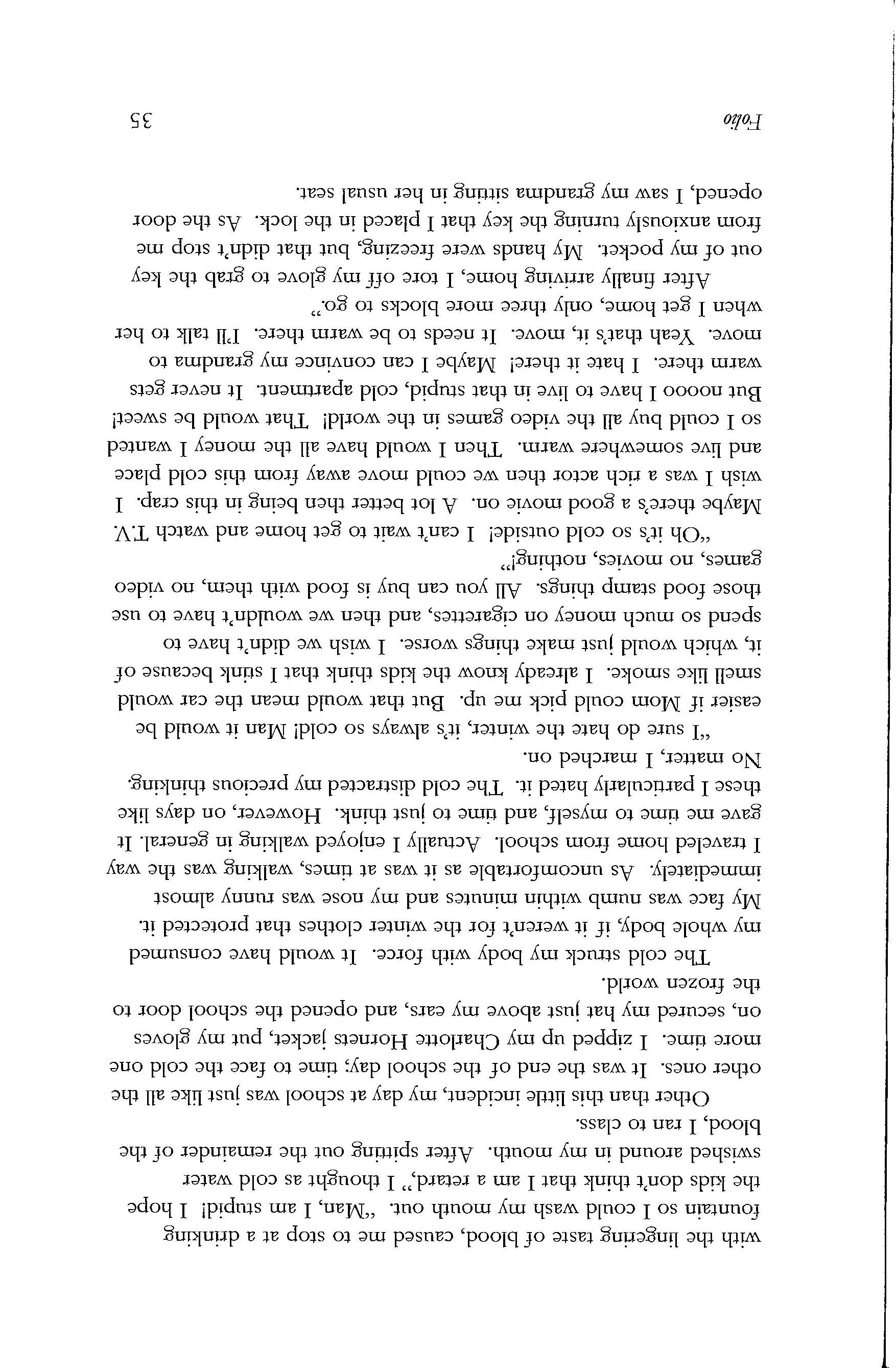
with the lingering taste of blood, caused me to stop at a drinking fountain so I could wash my mouth out. "Man, I am stupid! I hope the kids don't think that I am a retard," I thought as cold water swished around in my mouth. After spitting out the remainder of the blood, I ran to class.
Other than this little incident, my day at school was just like all the other ones. It was the end of the school day; time to face the cold one more time. I zipped up my Charlotte Hornets jacket, put my gloves on, secured my hat just above my ears, and opened the school door to the frozen world.
The cold struck my body with force. It would have consumed my whole body, if it weren't for the winter clothes that protected it. My face was numb within minutes and my nose was runny almost immediately. As uncomfortable as it was at times, walking was the way I traveled home from school. Actually I enjoyed walking in general. It gave me time to myself, and time to just think. However, on days like these I particularly hated it. The cold distracted my precious thinking. No matter, I marched on.
"I sure do hate the winter, it's always so cold! Man it would be easier if Mom could pick me up. But that would mean the car would smell like smoke. I already know the kids think that I stink because of it, which would just make things worse. I wish we didn't have to spend so much money on cigarettes, and then we wouldn't have to use those food stamp things. All you can buy is food with them, no video games, no movies, nothing!"
"Oh it's so cold outside! I can't wait to get home and watch T.V. Maybe there's a good movie on. A lot better then being in this crap. I wish I was a rich actor then we could move away from this cold place and live somewhere warm. Then I would have all the money I wanted so I could buy all the video games in the world! That would be sweet! But noooo I have to live in that stupid, cold apartment. It never gets warm there. I hate it there! Maybe I can convince my grandma to move. Yeah that's it, move. It needs to be warm there. I'll talk to her when I get home, only three more blocks to go."
After finally arriving home, I tore off my glove to grab the key out of my pocket. My hands were freezing, but that didn't stop me from anxiously turning the key that I placed in the lock. As the door opened, I saw my grandma sitting in her usual seat.
Folio 35

"Hi, what are you doing home?" I asked with curiosity in my v01ce.
"I felt sick and I couldn't afford to get the patients sick either, so they let me off early."
"How long have you been home?"
''About two hours. Rodney I have something to tell you," she said cautiously
"Could it be, we're moving? YESSSSSSS!" I thought to myself.
"Dean raised the rent again. I don't know if I can get you everything you want for Christmas." There was disappointment in her voice.
I went into my room. Shutting the door behind me, I plopped on my bed. The room still felt cold. "This winter will never end," frustration in my voice. "Wonder what's on T.V.?" Finding nothing on that interested me, my thoughts were turned to my sleepy body. "I am tired, I am gonna go to sleep." I grabbed the bunched up blanket on top of my bed. Sleep overtook me quickly and all my problems were delayed for another cold winter day.
Folio 36

Memory Grove and Joshua
April Olmos
dusty leather sandals
narrow creek
scent of wet feathers
bloody red fire bugs
people chattering from a distance flavor of peppermint gum
endless open sky
moist leaves rattling
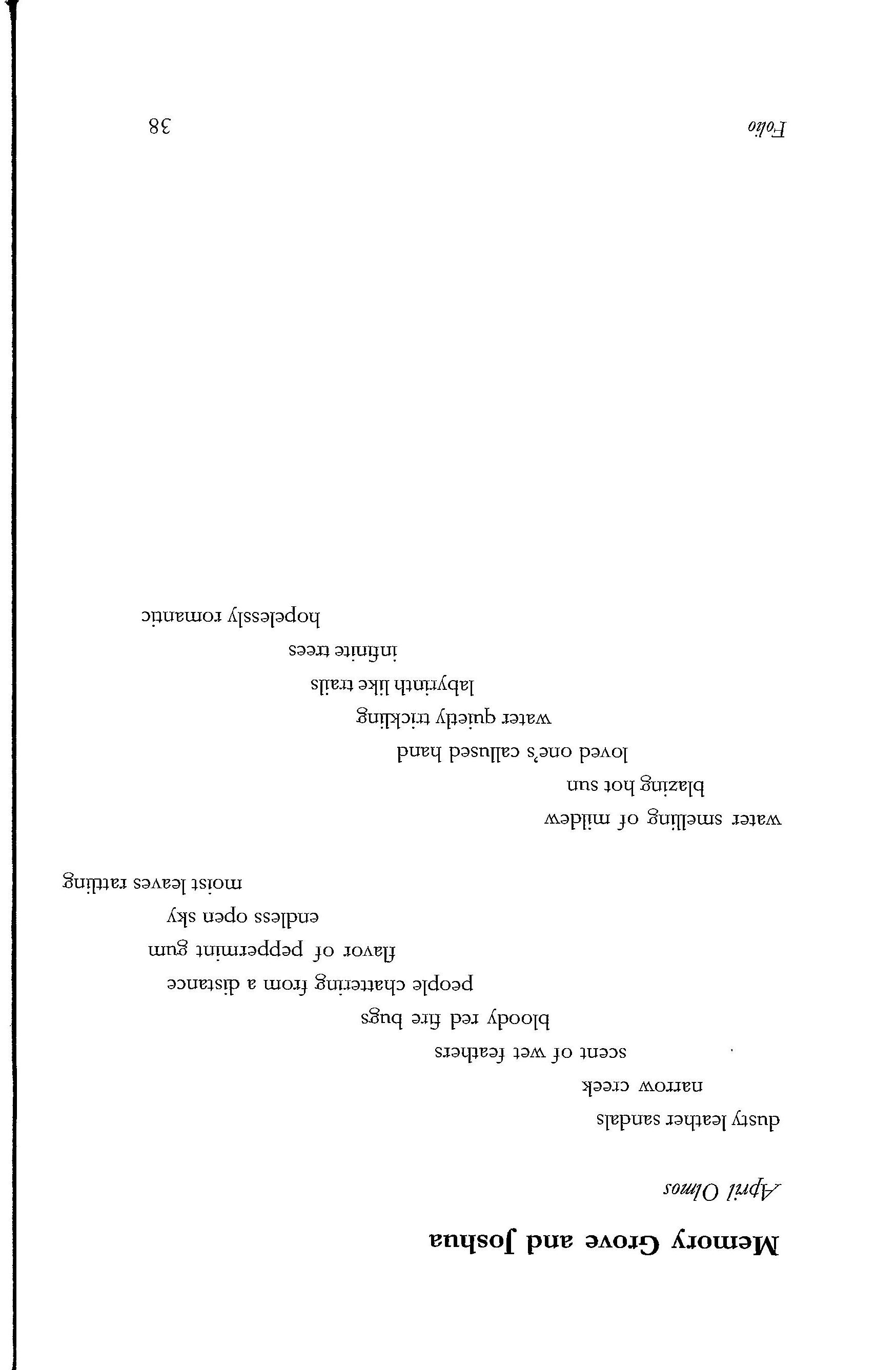
water smelling of mildew
blazing hot sun
loved one's callused hand
water quietly trickling
labyrinth like trails
infinite trees
hopelessly romantic
38
Folio
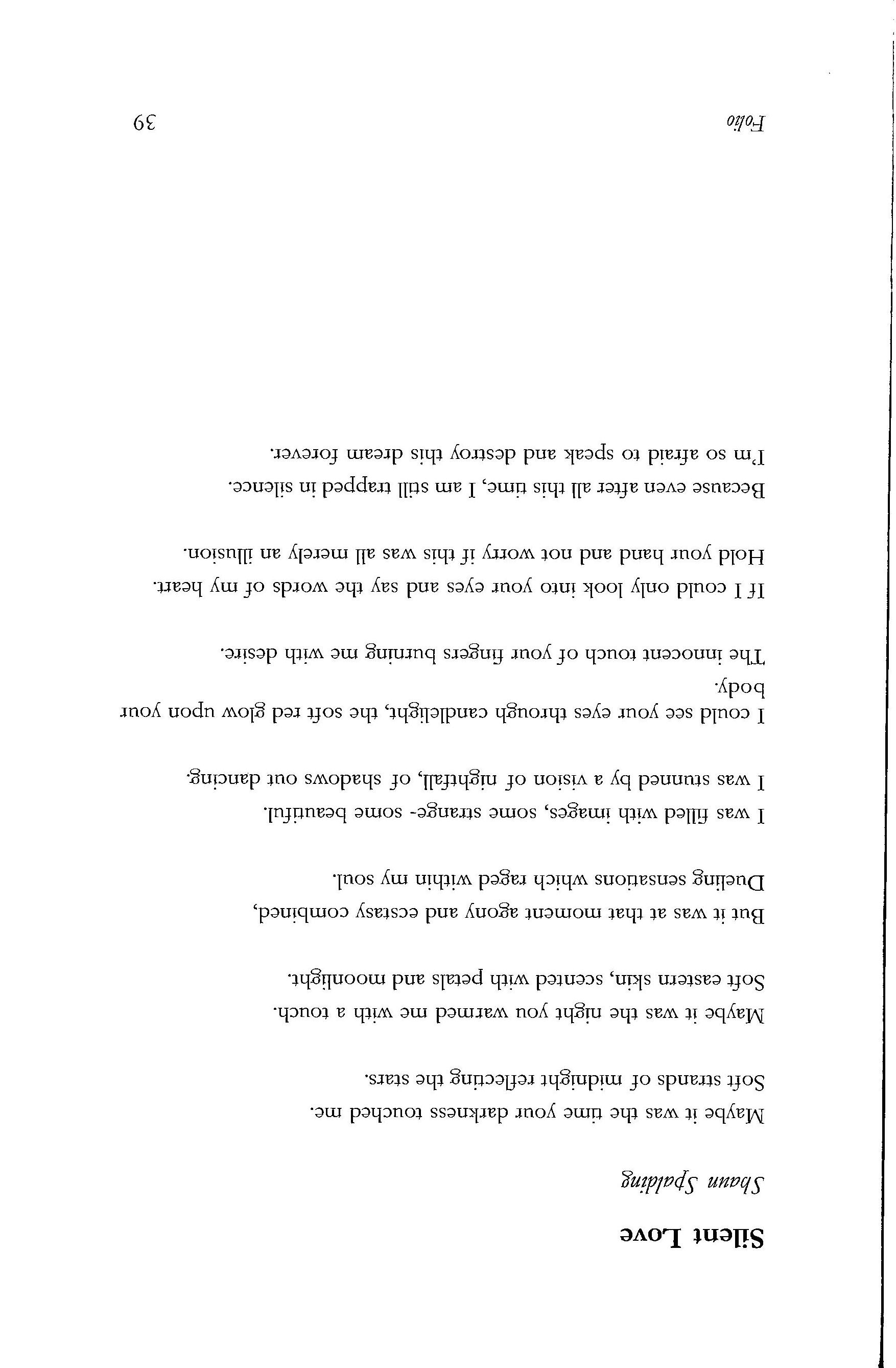
Silent Love
Shaun Spa/ding
Maybe it was the time your darkness touched me. Soft strands of midnight reflecting the stars.
Maybe it was the night you warmed me with a touch. Soft eastern skin, scented with petals and moonlight.
But it was at that moment agony and ecstasy combined, Dueling sensations which raged within my soul.
I was filled with images, some strange- some beautiful. I was stunned by a vision of nightfall, of shadows out dancing.
I could see your eyes through candlelight, the soft red glow upon your body.
The innocent touch of your fingers burning me with desire.
If I could only look into your eyes and say the words of my heart. Hold your hand and not worry if this was all merely an illusion.
Because even after all this time, I am still trapped in silence. I'm so afraid to speak and destroy this dream forever.
Folio 39
The Gift Of Disability
Aimee O'Brien
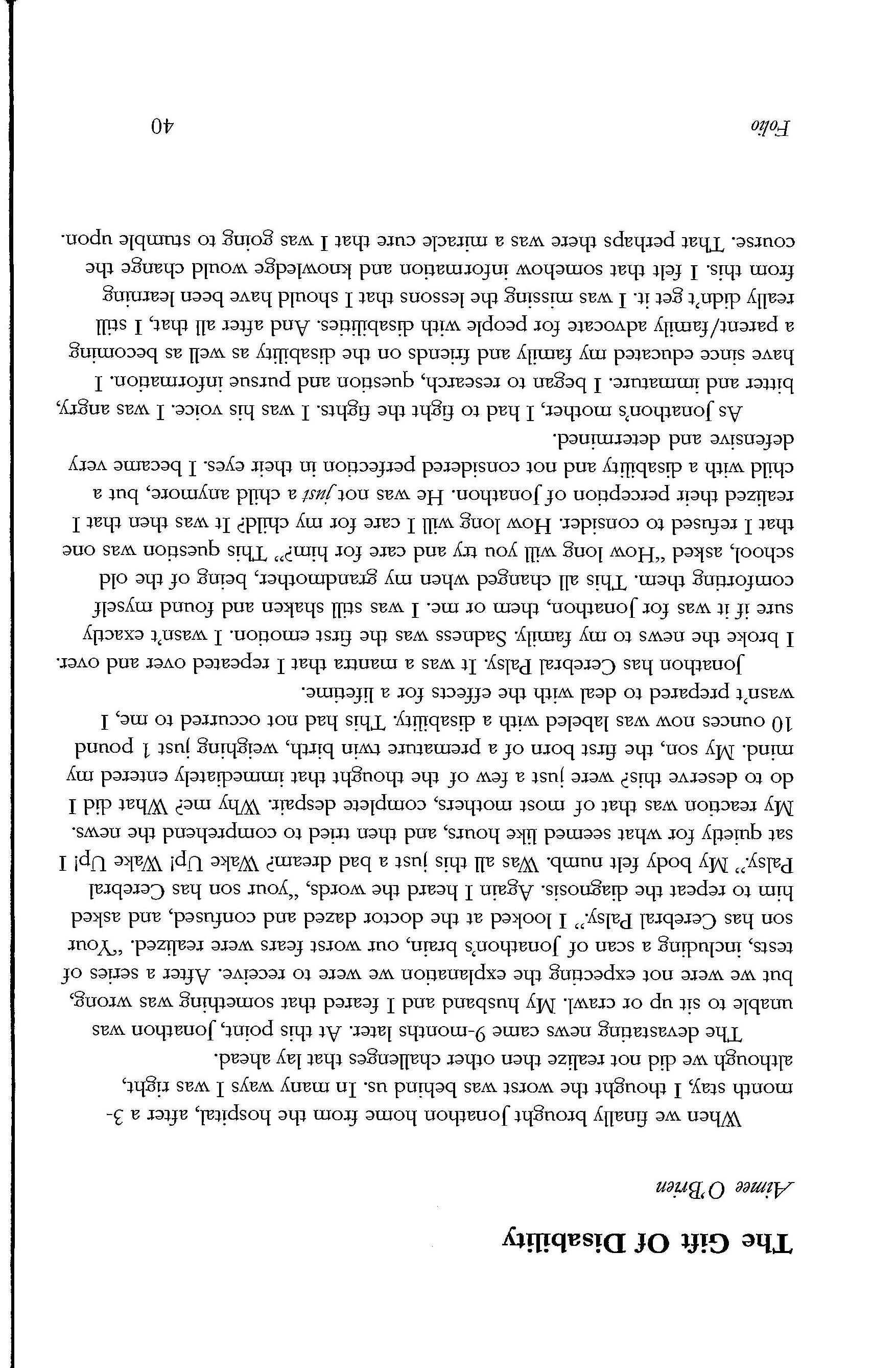
When we finally brought Jonathon home from the hospital, after a 3month stay, I thought the worst was behind us. In many ways I was right, although we did not realize then other challenges that lay ahead.
The devastating news came 9-months later. At this point, Jonathon was unable to sit up or crawl. My husband and I feared that something was wrong, but we were not expecting the explanation we were to receive. After a series of tests, including a scan of Jonathon's brain, our worst fears were realized. ''Your son has Cerebral Palsy." I looked at the doctor dazed and confused, and asked him to repeat the diagnosis. Again I heard the words, "your son has Cerebral Palsy." My body felt numb. Was all this just a bad dream? Wake Up! Wake Up! I sat quietly for what seemed like hours, and then tried to comprehend the news. My reaction was that of most mothers, complete despair. Why me? What did I do to deserve this? were just a few of the thought that immediately entered my mind. My son, the first born of a premature twin birth, weighing just 1 pound 10 ounces now was labeled with a disability. This had not occurred to me, I wasn't prepared to deal with the effects for a lifetime.
Jonathon has Cerebral Palsy. It was a mantra that I repeated over and over. I broke the news to my family. Sadness was the first emotion. I wasn't exactly sure if it was for Jonathon, them or me. I was still shaken and found myself comforting them. This all changed when my grandmother, being of the old school, asked "How long will you try and care for him?" This question was one that I refused to consider. How long will I care for my child? It was then that I realized their perception of Jonathon. He was not just a child anymore, but a child with a disability and not considered perfection in their eyes. I became very defensive and determined.
As Jonathon's mother, I had to fight the fights. I was his voice. I was angry, bitter and immature. I began to research, question and pursue information. I have since educated my family and friends on the disability as well as becoming a parent/ family advocate for people with disabilities. And after all that, I still really didn't get it. I was missing the lessons that I should have been learning from this. I felt that somehow information and knowledge would change the course. That perhaps there was a miracle cure that I was going to stumble upon.
Folio 40

Surely this was not going to be permanent.
I would look at my son and tears would well up in my eyes. There he would lie on his back, smiling and babbling as if he could see something I couldn't. Jonathon always seemed happy and this confused me. Did he understand all that he would be missing? He would never drive a car, he would never be a father, or even have a job. Again I questioned the logic, am I sad for him or for me?
After much needed reflection, I realize that these "things" are not important to him. He is happy watching videos and playing with toys. On any given day, a set of car keys brings a smile to his face. This was Jonathon's world and his every happiness. How simple.
This simplicity changed our life and is slowly changing the attitudes of my family.
Jonathon wants for nothing. He will never sin, and he will never hurt anyone with his words or actions. He puts no value on material things, fame and fortune. Yet he knows the importance of a loving family and friends. He greets you with a smile and he usually leaves one behind. That sounds like perfection to me.
As are all children,Jonathon is a gift, and those questions still go unanswered. W,0, me? What did I do to deserve him?
Folio 41
The Last
Chris Evans

CARL: So, it's a good thing we found each other.
CATHY: Why do you say that?
CARL: \'veil, because otherwise we'd be alone.
CATHY: So? I like being alone.
CARL: Oh. So should I go
CATHY: Well if you're already here you might as well stay.
CARL: Okay. (beat) So what do you think happened?
CATHY: I don't know. I don't even know if I care.
CARL: My bet is on aliens.
CATHY: Aliens.
CARL: Yup. Aliens.
CATHY: Whatever.
CARL: You got a problem with aliens?
CATHY: It's just everybody's always so quick to blame them for everything. Aliens gave me an anal probe. Aliens killed my sheep. Aliens disappeared everybody on earth. Please.
CARL: Hey, I've never blamed aliens for anything in my life until,, well even up to now. All I said is it could be aliens.
CATHY: No you didn't. You said you think it is aliens. That denotes blame.
CARL: Well c'mon, what's your theory? You're so quick to pooh-pooh mine.
CATHY: "Pooh-pooh"?
CARL: Don't change the subject.
CATHY: Fine. My theory is that Disneyland had some great deal that everybody but us heard about.
CARL: Disneyland.
CATHY: Yes. Right now everyone in the world is either inside, or standing in line for Disneyland.
CARL: That's crazy.
Folio 42

CATHY: Oh? Why is it crazy?
CARL: Nobody in their right mind would be standing in a line a world population wide just to get into Mr. Toad's Wild Ride. It's ludicrous.
CATHY: Just as ludicrous as aliens.
CARL: Aliens is a perfectly logical assumption.
CATHY: It is not.
CARL: Is so.
CATHY: Okay then smart guy, tell me why aliens would abduct everybody but you and I?
CARL: (beat) Well with you it's pretty obvious. But why they wouldn't want a prime specimen of man meat like me? That is a stumper.
CATHY: Well I'm glad I proved my point. Even if it did lead to an easy joke at my expense. But it does pose an interesting question. Have we been excluded or included?
CARL: From what?
CATHY: From whatever it is going on?
CARL: Is something going on?
CATHY: Of course something's going on. How many times have you woken up with the world missing.
CARL: Now we don't know that the world is missing. Maybe it's just this country.
CATHY: Right. Don't you think that if it was just this country there'd be like, a million foreigners here stealing all our cool stuff?
CARL: You're probably right.
Okay. I'm gonna say we've been excluded.
CATHY: Why?
CARL: Because they're all somewhere else and we're here. Majority wins.
CATHY: That's not party logic.
CARL: Okay, what does "party logic" mean?
CATHY: Party logic means that in a party, I'm referring to your average high school party, and if it's any kind of party at all only a small handful of people are invited, or included. So I think we've been included.
CARL: Interesting. Interesting. But there's something you haven't taken
Folio 43

into account.
CATHY: Pray tell.
CARL: It takes at least three to party.
CATHY: What are you basing that on?
CARL: Just about every pornographic movie I've seen. One is foreplay, two is a warm up, three you got yourself a hell of a party.
CATHY: Hm. No, I like mine.
CATHY (CONT'D) What's your name?
CARL: What's yours?
CATHY: I asked first.
CARL: My name's Carl.
CATHY: (breathes sigh of relief) Thank God.
CARL: Why?
CATHY: For a second there I was worried this was going to be one of those twilight zone thingies where your name is Adam and I'm Eve.
CARL: Your name's Eve?
CATHY: No. But wouldn't that be funny?
CARL: I guess. If your name's not Eve then why would you be worried about it being Eve?
CATHY: Because it would be the twilight zone. You never know what's going to happen in the twilight zone. No, that's wrong. You always knew there was going to be a twist ending. That was the one thing I didn't like about it.
CARL: You didn't like the twist endings?
CATHY: No, I liked them. I just didn't like the regularity of them. Think about it. If bizarre and weird become the norm, then they're no longer bizarre and weird, are they?
CARL: That there's a paradox. So...
CATHY: "So" what?
CARL: I mean, well, I guess it's up to our responsibility to propagate the species.
CATHY: Bullcrap it is. I'm not propagating anything.
CARL: What?
CATHY: You go propagate yourself you want to propagate some-
Folio 44

thing.
CARL: But what about the human race? Isn't it our duty to keep it going?
CATHY: Screw the human race. Only not literally, since, like I said, I'm not into that.
You know, you'd like that wouldn't you?
CARL: Like what?
CATHY: That's right. Keep the woman barefoot and pregnant. I knew you were one of those.
CARL: I am not one of those. Whatever it is those are I certainly am not one of them.
CATHY: I am not the subservient housewife, I'll tell you that right now.
CARL: I never said...
CATHY: You said it all. "Propagate", "Human race", "barefoot and pregnant".
CARL: You said barefoot and pregnant.
CATHY: I was just voicing your thoughts.
CARL: How do you know my thoughts? Hell, I don't even know my thoughts most the time.
CATHY: Oh I know your thoughts. Trust me, you're not that deep.
CARL: I'm not that deep? You're about to drown yourself in a half foot of water.
CATHY: I never claimed I was deep.
CARL: But deeper than me.
CATHY: A given.
CARL: Please.
CATHY: (beat) You're so transparent.
CARL: What now?
CATHY: You know the only reason you brought up the whole propagate thing was because you wanted to sleep with me.
CARL: That so?
CATHY: Yes it is. In fact, you're probably the one who did this whole thing just so someone would be forced to have sex with you.
Folio 45

CARL: I see. And naturally I picked you.
CATHY: Yes.
CARL: And why would I pick you?
CATHY: Because I am a stone cold fox.
CARL: Sure.
CATHY: Are you denying my foxiness?
CARL: No, no. You're hot. But don't you think I maybe could of picked someone, you know, someone I knew.
CATHY: You probably saw me on the street one day and said, "I've got to have her. If I have to disappear the entire earth to get her I will."
CARL: Interesting. Now tell me, if I could do this, disappear the entire earth just to have a reason to be with a woman, why the hell didn't I pick Natalie Portman?
CATHY: Ugh, you like her.
CARL: Ugh, I love her.
CATHY: I don't see it, personally.
CARL: Don't see what? The fact that she's a knock out?
CATHY: It is not a fact. She has no boobs.
CARL: Sure she does.
CATHY: Not big ones.
CARL: Neither do you.
CATHY: You take that back.
CARL: You don't.
CATHY: My boobs are the perfect size and shape according to my body type. Which is more than I can say for your "actress".
CARL: Oh, please tell me you didn't just do finger quoties.
CATHY: And what if I did?
CARL: I hate finger quoties. I had a teacher used to do that for everything, drove me crazy.
(mimicking teacher) The "expedition" started out with nary a "hitch." I asked him one time, "Hey, who're you quoting?" He looked at me like I was on drugs. Which I sort of was, but I still had a good point.
46
Folio
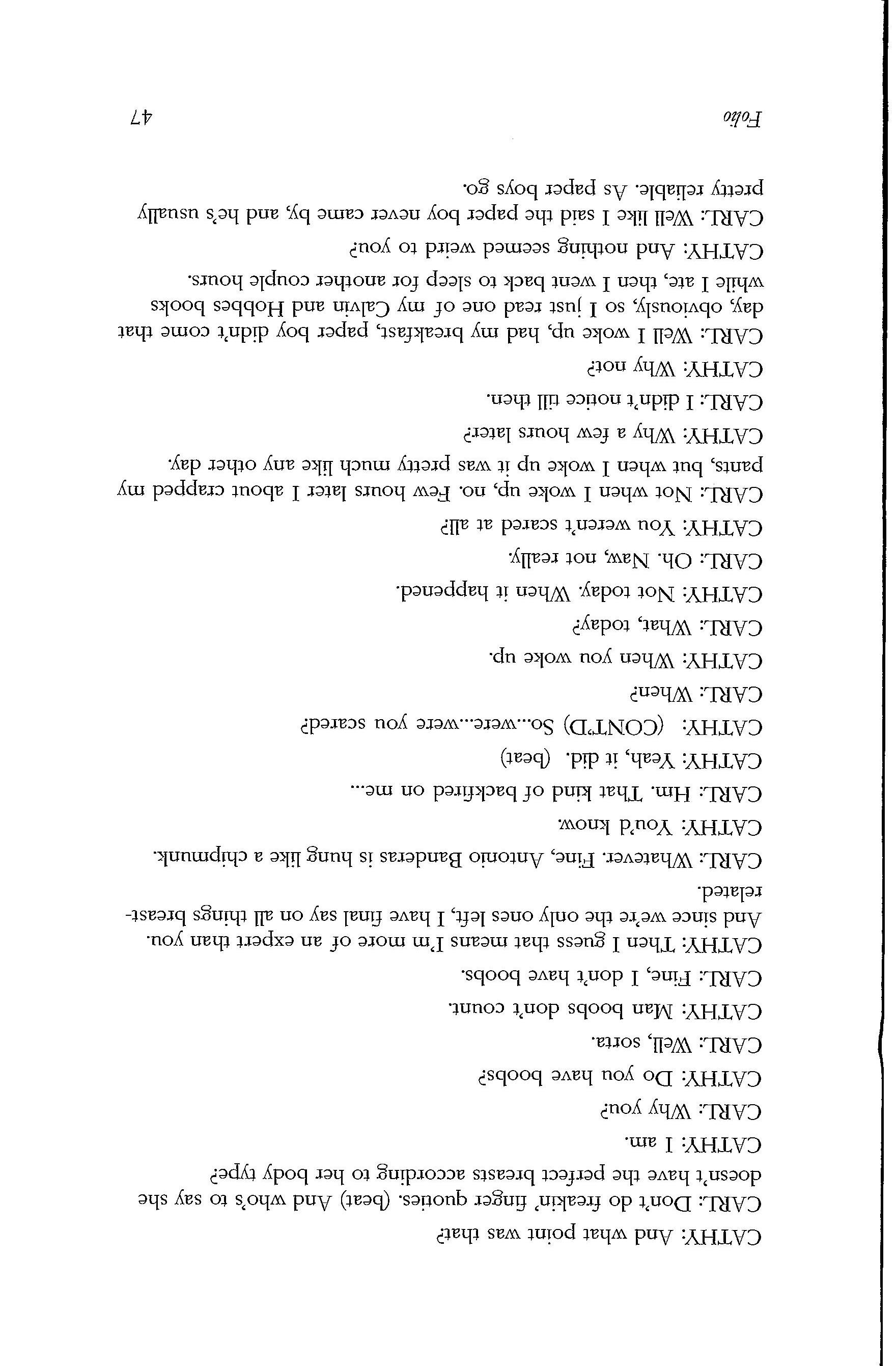
CATHY: And what point was that?
CARL: Don't do freakin' finger quoties. (beat) And who's to say she doesn't have the perfect breasts according to her body type?
CATHY: I am.
CARL: Why you?
CATHY: Do you have boobs?
CARL: Well, sorta.
CATHY: Man boobs don't count.
CARL: Fine, I don't have boobs.
CATHY: Then I guess that means I'm more of an expert than you. And since we're the only ones left, I have final say on all things breastrelated.
CARL: Whatever. Fine, Antonio Banderas is hung like a chipmunk.
CATHY: You'd know.
CARL: Hm. That kind of backfired on me ...
CATHY: Yeah, it did. (beat)
CATHY: (CONT'D) So...were ... were you scared?
CARL: When?
CATHY: When you woke up.
CARL: What, today?
CATHY: Not today. When it happened.
CARL: Oh. Naw, not really.
CATHY: You weren't scared at all?
CARL: Not when I woke up, no. Few hours later I about crapped my pants, but when I woke up it was pretty much like any other day.
CATHY: Why a few hours later?
CARL: I didn't notice till then.
CATHY: Why not?
CARL: Well I woke up, had my breakfast, paper boy didn't come that day, obviously, so I just read one of my Calvin and Hobbes books while I ate, then I went back to sleep for another couple hours.
CATHY: And nothing seemed weird to you?
CARL: Well like I said the paper boy never came by, and he's usually pretty reliable. As paper boys go.
Folio 47

CATHY: Judas, you're stupid. When did you notice?
CARL: What, the people missing?
CATHY: Yes, the people missing.
CARL: Started when I went next door to borrow a cup of butter for the cookies I was making. I went next door to Sherry and Toolie's place and nobody was home. So then I went to Elmer's and he wasn't home either. Now usually I don't go to Elmer's to borrow stuff cause then he's gonna want to tell me about something that happened a long time ago that I don't give a rat's ass about. But I needed the butter so I went over. I started worrying when he didn't answer. Man hasn't left his home in the three years I've lived there. I thought he'd had a heart attack on the toilet or something.
CATHY: Why the toilet?
CARL: Guess I just thought it'd be funnier that way. Luckily though he wasn't dead, I don't know what I'd do if I saw a dead body.
CATHY: Oh yeah, luckily it was just the whole world missing.
CARL: The world's still here. It's just the people gone.
CATHY: Oh well touche, sir, touche.
CARL: It is so aliens.
CATHY: Well of course it's aliens. I'm not a complete idiot, no matter what my guidance counseler said. What else could it be but aliens?
CARL: Government?
CATHY: Oh like there's a difference.
CARL: So where do we go from here?
CATHY: Go? Why do we have to go anywhere?
CARL: I was talking figuratively.
CATHY: And I was answering you.
CARL: Well we gotta go somewhere.
CATHY: I don't see why.
CARL: Well, 'cause if we don't go somewhere then we're just sitting here.
CATHY: We are just sitting here.
CARL: I was talking...
CATHY: And I was being literal.
CARL: (beat) Well suck. I dunno.
Folio 48

CATHY: Want to hear my plan?
CARL: No.
CATHY: We sit here, literally sit here.
CARL: Okay.
CATHY: And be confused.
CARL: That's it.
CATHY: Yeah.
CARL: That's your plan.
CATHY: Yeah.
CARL: We sit here and ...
CATHY: Yeah.
CARL: Beats <loin' stuff, I guess.
They sit there. Confused.
Folio 49
Reflections
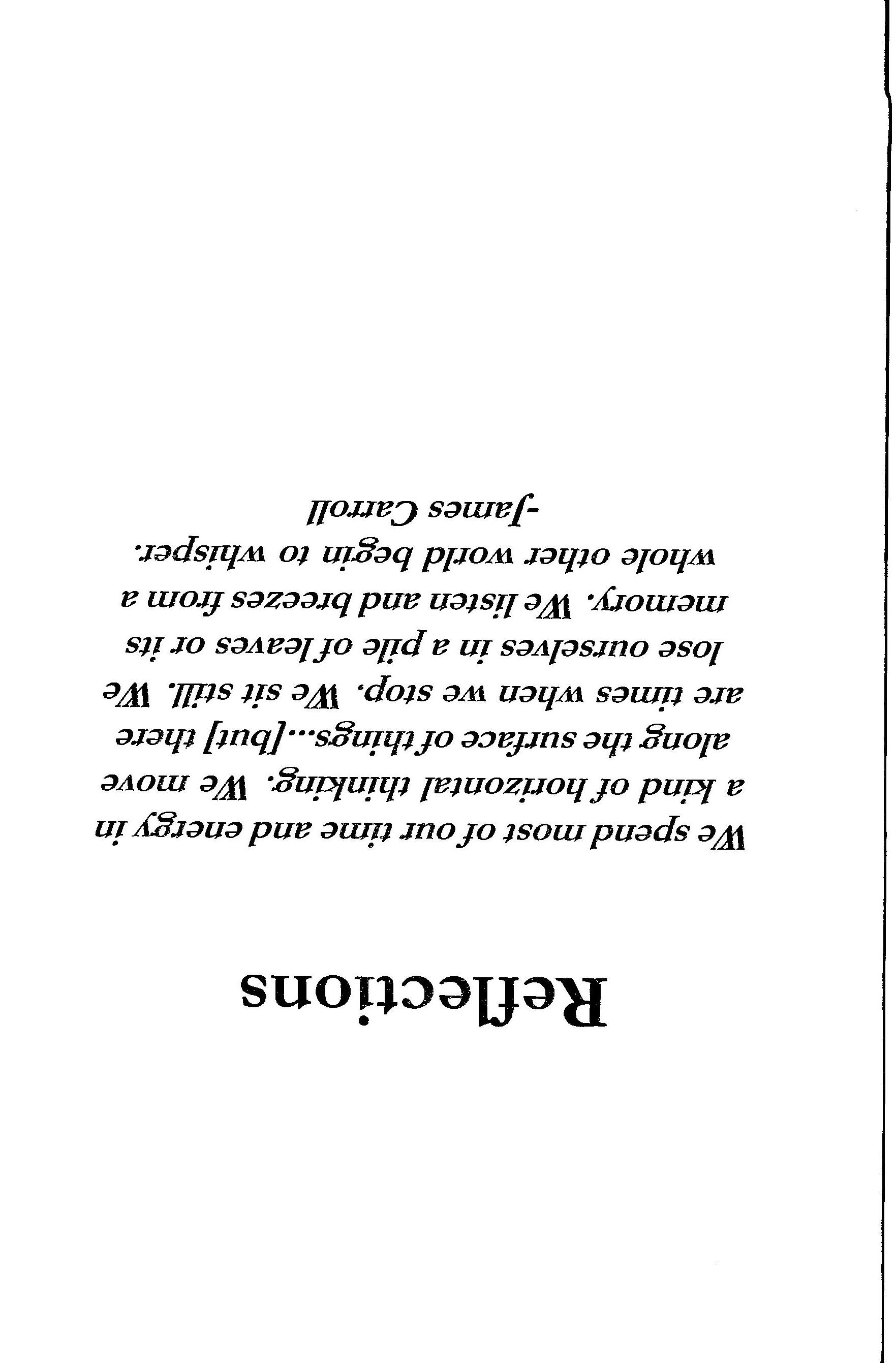
We spend most ofour time and energy in a kind of horizontal thinking. We move along the surface ofthings... [but] there are times when we stop. We sit still We lose ourselves in a pile ofleaves or its memory. We listen and breezes from a whole other world begin to whisper.
-James Carroll

Picture from the Hubble Space Telescope
Brandon D. Alva
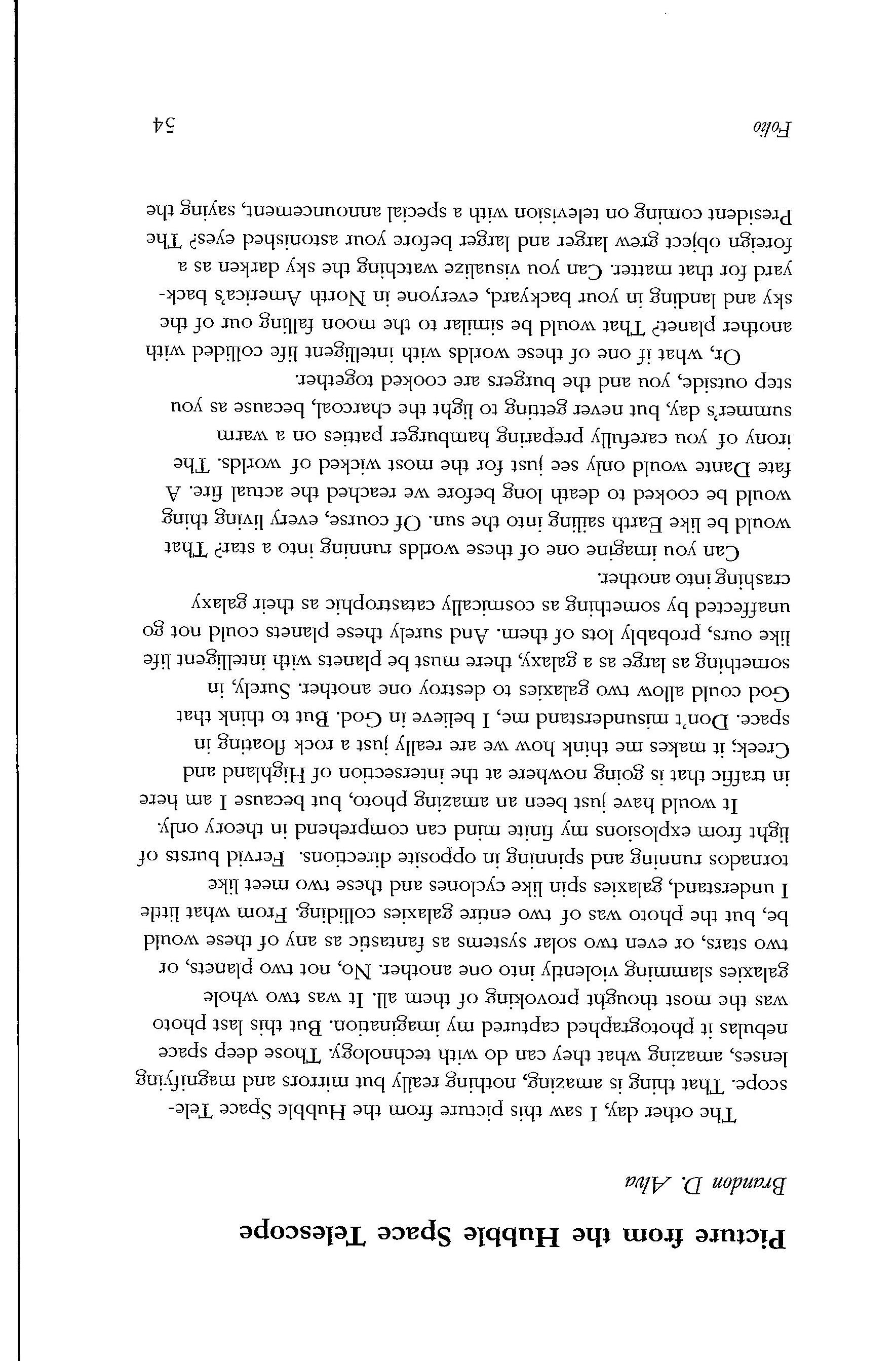
The other day, I saw this picture from the Hubble Space Telescope. That thing is amazing, nothing really but mirrors and magnifying lenses, amazing what they can do with technology. Those deep space nebulas it photographed captured my imagination. But this last photo was the most thought provoking of them all. It was two whole galaxies slamming violently into one another. No, not two planets, or two stars, or even two solar systems as fantastic as any of these would be, but the photo was of two entire galaxies colliding. From what little I understand, galaxies spin like cyclones and these two meet like tornados running and spinning in opposite directions. Fervid bursts of light from explosions my finite mind can comprehend in theory only.
It would have just been an amazing photo, but because I am here in traffic that is going nowhere at the intersection of Highland and Creek; it makes me think how we are really just a rock floating in space. Don't misunderstand me, I believe in God. But to think that God could allow two galaxies to destroy one another. Surely, in something as large as a galaxy, there must be planets with intelligent life like ours, probably lots of them. And surely these planets could not go unaffected by something as cosmically catastrophic as their galaxy crashing into another.
Can you imagine one of these worlds running into a star? That would be like Earth sailing into the sun. Of course, every living thing would be cooked to death long before we reached the actual fire. A fate Dante would only see just for the most wicked of worlds. The irony of you carefully preparing hamburger patties on a warm summer's day, but never getting to light the charcoal, because as you step outside, you and the burgers are cooked together.
Or, what if one of these worlds with intelligent life collided with another planet? That would be similar to the moon falling our of the sky and landing in your backyard, everyone in North America's backyard for that matter. Can you visualize watching the sky darken as a foreign object grew larger and larger before your astonished eyes? The President coming on television with a special announcement, saying the
Folio 54

scientists are doing all they can and asking you to pray for America and the whole world. And despite your prayers, it only speeded in approach as it grew closer. Can you imagine staring at that foreign world only to discover it is one like your own, and that its inhabitants look at your world with the same horror and prayed the same prayers that you prayed, that your world would not destroy theirs? But then the sky becomes an endless black and your worlds meet with such force that you and those like you are both pulverized and incinerated instantaneously. Contact with another world, but in a way you never imagined.
I am sorry, the things I think of while stuck at this traffic light. The thing I hate most about red lights is that when I am late, I work so hard to pass those elderly people who drive so slow, and then at the very next red light guess who pulls up behind me. It's like a modern day tortoise and the hare parable, and I'm always the hare. No matter how you drive, the system shuffles you together. I guess I take the green lights for granted; I mean if I have a green light that means someone else has a red. I spend way too much time thinking about this sort of irrelevant material, I often find myself reading books and hoping they will not end, because then it is back to reality. I suppose if I was normal, I would watch television to escape reality, something really never ends. But as I have gotten older I don't really enjoy it. It is all about selling you something. How to do that is the only question producers ask. Last year's answer, Britney Spears, hit the scene a softfaced self-proclaiming virgin. But funny thing she can't help but play the tease, the little outfits, the suggestive dancing. The naivete only seems to add to the sex appeal. How you ask? Oh we do flatter ourselves, she is a good girl but she would be naughty just for me. A society that prizes virgins but only for the personal deflowering. Hey, that guy in the Jag: is that who I think it is? It is, it's the guy from the Japanese place I always eat at. That's kind of sad that I know the other regulars by sight, but this guy by the way he struts around in his brand new, always washed, always waxed, black Jaguar, and how he never puts down his cell phone even while ordering his teriyaki salmon bowl to go. I guess he doesn't put down his cell phone while driving either, but seeing as how we are going nowhere that is probably not a cnme.
Ha, the guy who just pulled up in the turn lane drives the exact same Jaguar, down to the tan leather interior. What are the odds?
Folio 55

Everybody wants to be first up the mountain. Everybody wants to be special, unique, important. And with this desire to be one-of-akind driving us somehow, we all end up at the same shopping malls searching for parking because there are too many unique individuals to accommodate. Drinking soda pop because Britney told us to, your doctor certainly wouldn't. If you don't smoke, soda pop is probably the most toxic thing you take in your body on a regular basis. Don't get me wrong, I am not some misanthropist who never drinks soda pop. I don't stay up at night worrying about some caramelized devil or his carbonated henchmen. I mean I work at a gas station; I'm a distributor for Winston Salem in that sense. And I do drink the soda; employees get it for free from the fountain, employees and cops. It's not a bad job. They pay me to sell beef jerky and beer, mop the floor, read the newspaper, and make sure no one lights themselves on fire. Not that if some smoking fool did spray gasoline all over himself I would be able to save him. We would all just enjoy the light show, I guess. Try to keep him from colliding with other highly flammable objects.
I'm sorry, being stuck at a red light is no excuse to think such morbid thoughts. I probably get it from reading the newspaper. ''We need to decrease our dependence on foreign oil," probably true, easily said. The articles about the D.C. sniper were terrifying. A rifle and a scope. Scary what they did with such simple technology.
I am watching the girl in the blue Accord, she looks alright but she has to be high maintenance because she is using her rear view mirror to watch herself too. She keeps grooming herself. Checking her eye shadow, moving one hair from one side to the other. Now I can't help but laugh because she keeps taking her pinky finger and trying to remove a spot between her cheek and her nose that is simply not there. I'm over here and I can see there is nothing there. Honey, stop it there's nothing there.
I think this gun I'm checking might be worse for me than soda. It has both sugar and carcinogens in it. Originally the carcinogens were to replace the sugar but for some reason this gum has both. I guess the carcinogens are industrial waste products and if they just dumped them in a stream the EPA would get them so they put them in my gum instead. People buy it anyway. It is almost impossible to find gum without aspartame in it, sugar free or regular. I thought about writing
Folio 56

the gum company but how naive is that? Llke the CEO of the gum company is going to yell "Stop the assembly line!" after reading my personal letter. No, they'd probably ignore it, and if they didn't at best they would send me some more gum (free of charge imagine that).
Dear Customer #3,756,892,331
We are sorry to hear you are concerned about the mild poisons in our bubble gum. To ease your grief we have enclosed some of our new fruity flavors. We truly hope you find these new and improved flavors more palatable than the government laboratory rats did.
Sincerely Carefree-about your health
Oh I guess there are worse social injustices going on in the world today. And, nobody forces me to chew bubble gum. Nobody forces all the people at the gas station to come in and buy it either. Soda pop and gum are almost like gasoline: almost everybody comes in and buys them from me. You meet all kinds of people working at a gas station, lots of cute girls too. But then a lot of them come up to the counter and in a hoarse voice say "Can I have a pack of Camel Llghts?" Yeah, it just about kills me. All the nice girls pay at the pump. Hey, if you don't have any vices what would you come in the store for?
The other day this lady and her daughter came in. The lady got cigarettes and told her daughter to hurry and pick something out. The girl grabbed two things of snack cakes and met her mom at the counter. ''You want them both?" the mom said. ''Yeah," said the girl, "I'll save one for later." The mom paid for it all and said ''You know so far you getting this new job has cost me twenty bucks," and she headed for the door. "I'm sorry mom, you want me to put one back?" "No, it's just the cigarettes and all, let's just go." "I'm sorry, mom. I'm sorry," she repeated walking out the door after her mother.
Man, by the time this light turns green, I will have forgotten what I'm supposed to do. I guess I have too much time on my hands to think, 'cause it was only it was only twenty bucks but I worry about those people, people like them the world over. But it's probably just a waste of my time. I mean it's like those distant galaxies--nothing I could do, nothing anyone could do, forces set in motion long before we were born. Not that it really matters; my guess is all the inhabitants die instantly, without feeling, when worlds collide.
Folio 57
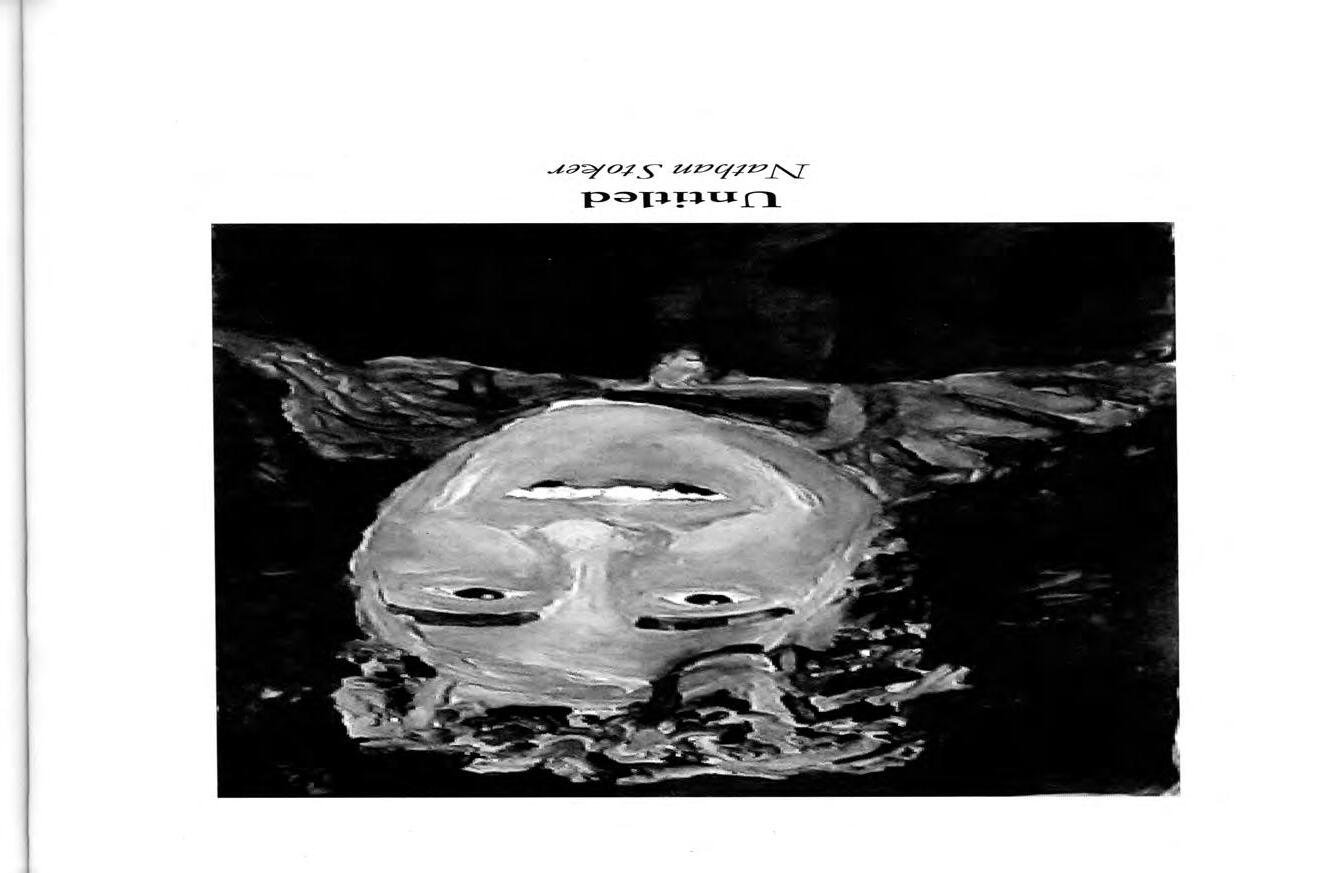
Revelations and Revolutions
Jen Walters

As the house lights dimmed, my body was giving rise to an explosion. Waves of energy surged through my body the way electricity cuts through air just before a thunderstorm. The blur of the drink and the sweat beading on my forehead was inebriating every sense, yet sobering my lucid consciousness. It was as if I had been shaken up, my blood like carbon dioxide, frothing in my veins. Clenching my fists, the anticipation wasn't anything I hadn't felt before. Glancing around with wild anxiety, I saw the faces of those around me and I knew they were experiencing the same physical metamorphosis that I was. We had become caged animals, ready to be let loose. Then came the thump of the pedal beating on the unforgiving skins of the kick drum, transitioning into a silky-smooth snare roll, reverberating in my guts. The beat started the fuel that was further feeding my impatience, until the glorious first chords of the Gibson Les Paul screeching out of the Marshall stack were struck. I knew instantly where I belonged.
We were all at the show unified together, oblivious to everything but that moment. It was the only time and place where nothing of the day that burdened us with fear, insecurity, and rage could interfere with. There were no worries at the shows, except for the vigilance required to defend yourself from flying boots and limbs. A code of ethics governed our etiquette because there was an unspoken camaraderie. We looked out for one another, rescuing stragglers from the floor of the hurricane who had been tossed into its vortex of merciless bodies called the "circle pit." We were punk rock soldiers who danced and sang and threw our arms around strangers to join us in the circle, where all frustrations were completely lost. Nothing mattered at the shows because it was the only clarity in an unclear world. We were kids who fought. It wasn't a violent anger, though we raised our fists high in unison to the anthems of our hopeful new tomorrow. This was our time, our fight, and we demanded to be heard. We were loud, obnoxious, and crude, but we were honest, and that is how we came together.
It is defiance that feeds our angst and civil disobedience that organizes our convictions. To defy was to impart strength; to have
Folio 59
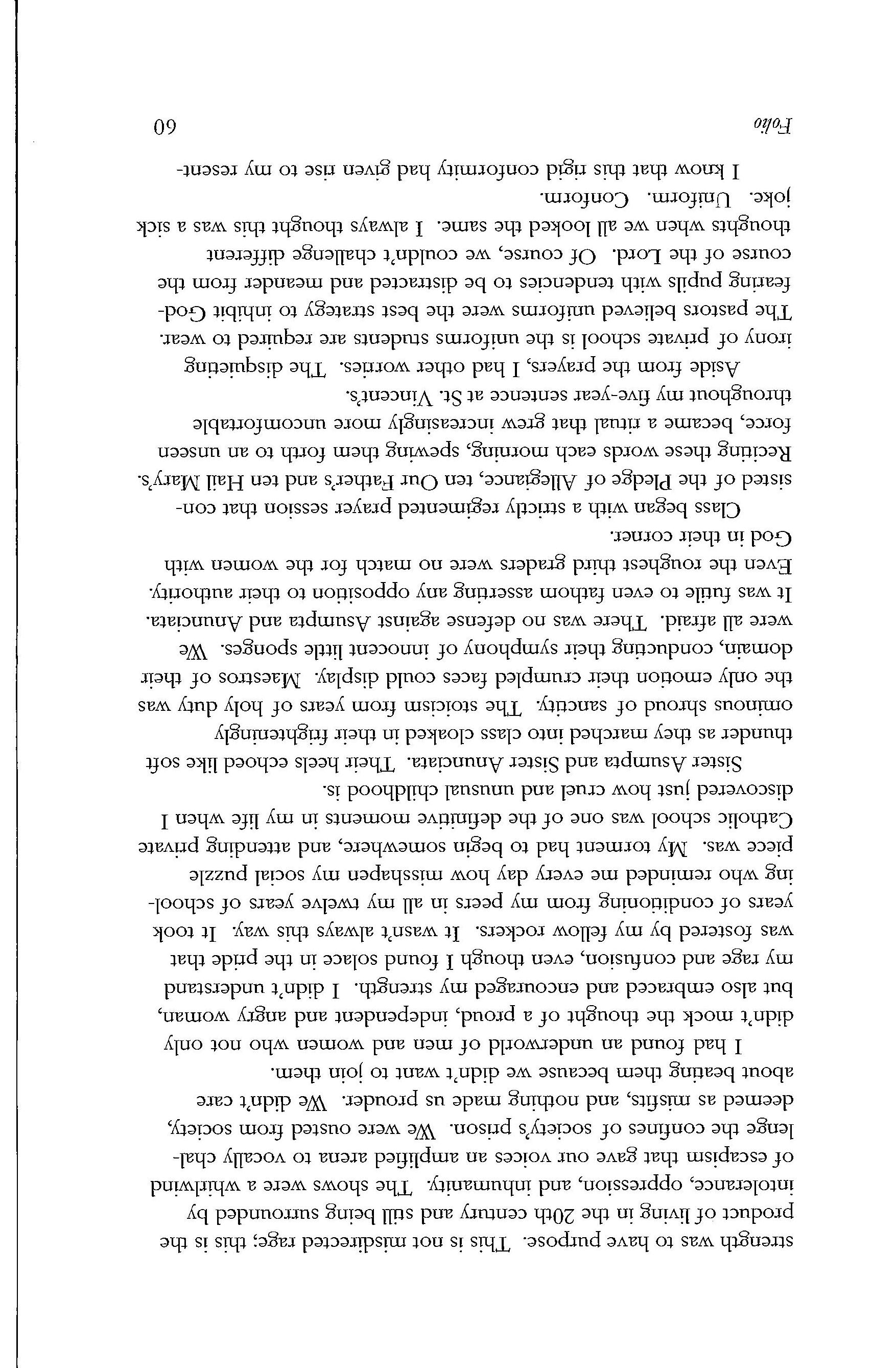
strength was to have purpose. This is not misdirected rage; this is the product of living in the 20th century and still being surrounded by intolerance, oppression, and inhumanity. The shows were a whirlwind of escapism that gave our voices an amplified arena to vocally challenge the confines of society's prison. We were ousted from society, deemed as misfits, and nothing made us prouder. We didn't care about beating them because we didn't want to join them.
I had found an underworld of men and women who not only didn't mock the thought of a proud, independent and angry woman, but also embraced and encouraged my strength. I didn't understand my rage and confusion, even though I found solace in the pride that was fostered by my fellow rockers. It wasn't always this way. It took years of conditioning from my peers in all my twelve years of schooling who reminded me every day how misshapen my social puzzle piece was. My torment had to begin somewhere, and attending private Catholic school was one of the definitive moments in my life when I discovered just how cruel and unusual childhood is.
Sister Asumpta and Sister Anunciata. Their heels echoed like soft thunder as they marched into class cloaked in their frighteningly ominous shroud of sanctity. The stoicism from years of holy duty was the only emotion their crumpled faces could display. Maestros of their domain, conducting their symphony of innocent little sponges. We were all afraid. There was no defense against Asumpta and Anunciata. It was futile to even fathom asserting any opposition to their authority. Even the roughest third graders were no match for the women with God in their corner.
Class began with a strictly regimented prayer session that consisted of the Pledge of Allegiance, ten Our Father's and ten Hail Mary's. Reciting these words each morning, spewing them forth to an unseen force, became a ritual that grew increasingly more uncomfortable throughout my five-year sentence at St. Vincent's.
Aside from the prayers, I had other worries. The disquieting irony of private school is the uniforms students are required to wear. The pastors believed uniforms were the best strategy to inhibit Godfearing pupils with tendencies to be distracted and meander from the course of the Lord. Of course, we couldn't challenge different thoughts when we all looked the same. I always thought this was a sick joke. Uniform. Conform.
I know that this rigid conformity had given rise to my resent-
Folio 60
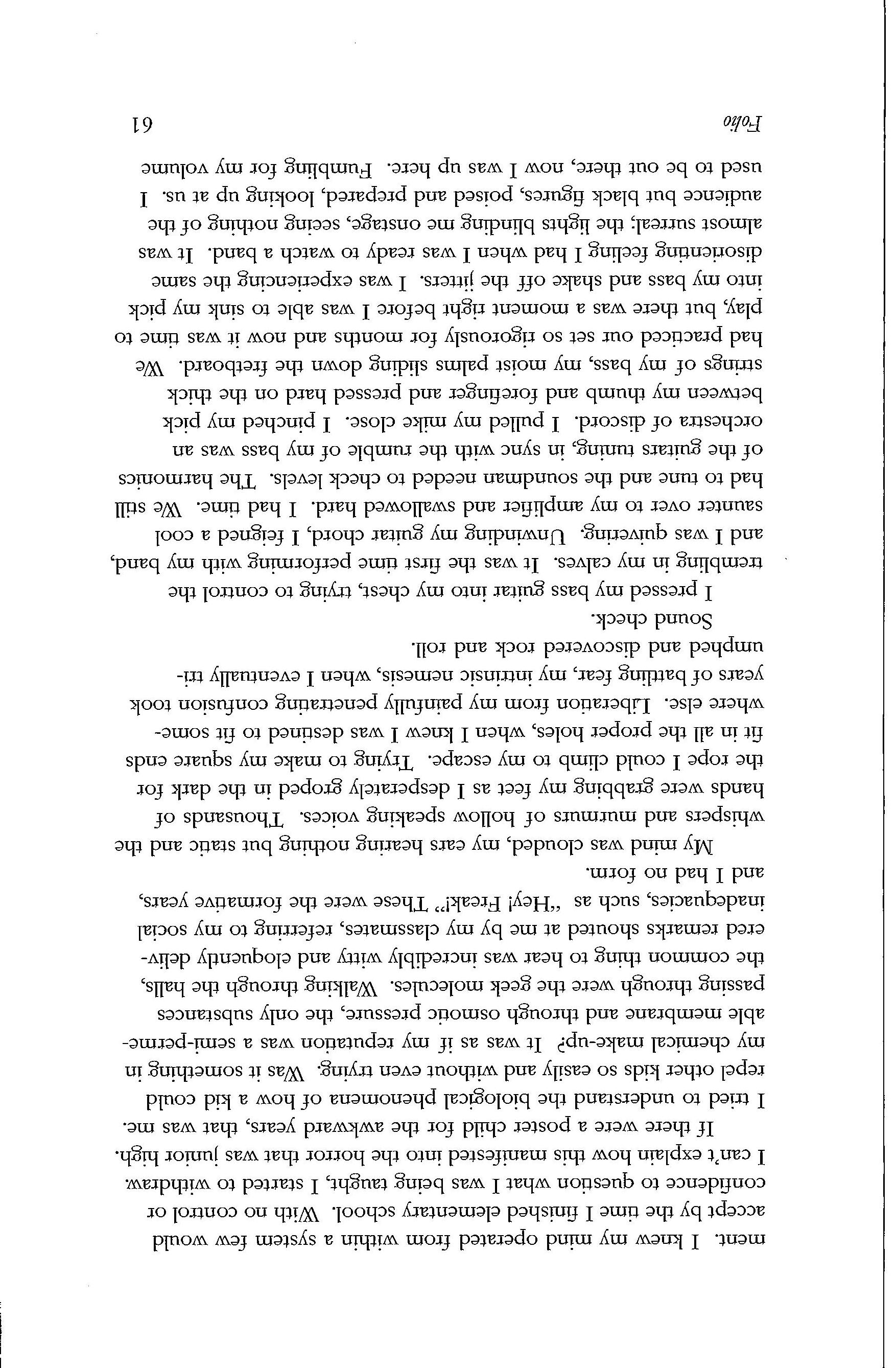
ment. I knew my mind operated from within a system few would accept by the time I finished elementary school. With no control or confidence to question what I was being taught, I started to withdraw. I can't explain how this manifested into the horror that was junior high. If there were a poster child for the awkward years, that was me. I tried to understand the biological phenomena of how a kid could repel other kids so easily and without even trying. Was it something in my chemical make-up? It was as if my reputation was a semi-permeable membrane and through osmotic pressure, the only substances passing through were the geek molecules. Walking through the halls, the common thing to hear was incredibly witty and eloquently delivered remarks shouted at me by my classmates, referring to my social inadequacies, such as "Hey! Freak!" These were the formative years, and I had no form.
My mind was clouded, my ears hearing nothing but static and the whispers and murmurs of hollow speaking voices. Thousands of hands were grabbing my feet as I desperately groped in the dark for the rope I could climb to my escape. Trying to make my square ends fit in all the proper holes, when I knew I was destined to fit somewhere else. Liberation from my painfully penetrating confusion took years of battling fear, my intrinsic nemesis, when I eventually triumphed and discovered rock and roll.
Sound check.
I pressed my bass guitar into my chest, trying to control the trembling in my calves. It was the first time performing with my band, and I was quivering. Unwinding my guitar chord, I feigned a cool saunter over to my amplifier and swallowed hard. I had time. We still had to tune and the soundman needed to check levels. The harmonics of the guitars tuning, in sync with the rumble of my bass was an orchestra of discord. I pulled my mike close. I pinched my pick between my thumb and forefinger and pressed hard on the thick strings of my bass, my moist palms sliding down the fretboard. We had practiced our set so rigorously for months and now it was time to play, but there was a moment right before I was able to sink my pick into my bass and shake off the jitters. I was experiencing the same disorienting feeling I had when I was ready to watch a band. It was almost surreal; the lights blinding me onstage, seeing nothing of the audience but black figures, poised and prepared, looking up at us. I used to be out there, now I was up here. Fumbling for my volume
Folio 61

knob, I closed my eyes and took a deep breath as the lump in my throat slid back. Taking one last look at the crowd, I pitched my face into my mike and shouted: 1-2! 1-2-3-4!
62
Folio
It's Called a "Generation Gap"
Amanda Kesler

"Too bad the things that make you mad are my favorite things." Incubus, Favorite Things
Volumes and volumes of textbooks can be written on the rise or decline of society. On the decline end of that written spectrum, we have a huge tendency to glamorize the past and then assert our superiority over anyone else by slamming the current age. Alan Bloom does a fabulous example of this in his essay "Music" from The Closing of the American Mind. I strongly agree with his general appraisal that the current generation (not to the exclusion of any others) is wanton and maleducated. However, his arguments are ridiculous and prove over and over to be the rantings of a man who doesn't understand that he is only witnessing changes across an everyday generation gap.
His essay begins by describing in detail the pervasion of rock music into the lives of youth. "The power of music in the soul ... has been recovered after a long period of desuetude," Bloom says, and details the fall of classical music in American culture and the revolution that put rock music on top (41). All music has a raw nature, he states, and "rock music has one appeal only, a barbaric appeal, to sexual desire" (45). This has lead into the sexual revolution, and Bloom tells how it has ended in hypocrisy, how the nature of the generation of which he wrote has become immediate and far too sexual. Rock has pervaded capitalistic society (48-49), and popular society. Mick Jagger was the centerpiece of this culture for fifteen years, but has faded to give rise to others who, as Bloom says, "are even weirder than he is" (51). Again he says that rock gives its young listeners "premature ecstasy" (52), and says that when all is said and done, the youth may come out deaf (53).
But can we be any more deaf than the author himself? Who better to find superiority in libeling the current age than one that was there during the virtuous fifties when, of course, no extramarital sex
Folio 63

occurred and every American was well educated? When not a teenager from sea to shining sea wondered what sex felt like, and no college student enjoyed watching Elvis gyrate madly on stage? Yes, that is laughably off the mark, and also a blaring overgeneralization. Bloom would no doubt throw it aside as nonsense, just as I have done with his work. Tit for tat. Overgeneralization is clearly one of Bloom's pet literary devices.
The first sentence of the clip published in the Mercury Reader is his first example of overgeneralization so severe that it alone could discredit the entire piece as gibberish but unfortunately hasn't. "Though students do not have books, they most emphatically do have music." Being an avid reader and furiously protective of my personal stash of books, I take great offense at this. Many of my friends love their books, and those that don't have a desire to read haven't been corrupted by rock music into that choice, it is simply a personal decision. Is Bloom trying to somehow state that books and rock music are mutually exclusive, that I can't sit back and enjoy Shelley's Frankenstein with Incubus's Fungus Amongus tickling my ears? This is only Bloom's first statement of the piece extracted from the Mercury Reader. He only continues to dig his "scholarly" hole as he proceeds.
Bloom is quite right that music pulls on deep emotional cords within us and elicits a response that only music can, some heightened emotion that without music is hard to duplicate. It is barbarous, but then he gives his next laughable remark, a flat falsehood - "Nothing is more singular about this generation than its addiction to music." Is that so? The take-anywhere transistor radio was not invented in the Eighties. Neither was the car radio. Music went everywhere with the young generation back when my parents were yet pipsqueaks. "It is their passion," he says, referring to the youth of the Eighties, "nothing else excites them as it does; they cannot take seriously anything alien to music." I sincerely believe this to be false. The music of course is designed to be emotional, bring out something that nothing else can, but the implication that the majority of us cannot take anything else seriously is flatly insulting. I am within it; I can see all around me that my peers, while taken often by music in spare time, are quite serious about their lives. "When they are in school and with their families, they are longing to plug themselves back into their music." Of course, but is this any different from the teens of any other era longing for enter-
Folio 64
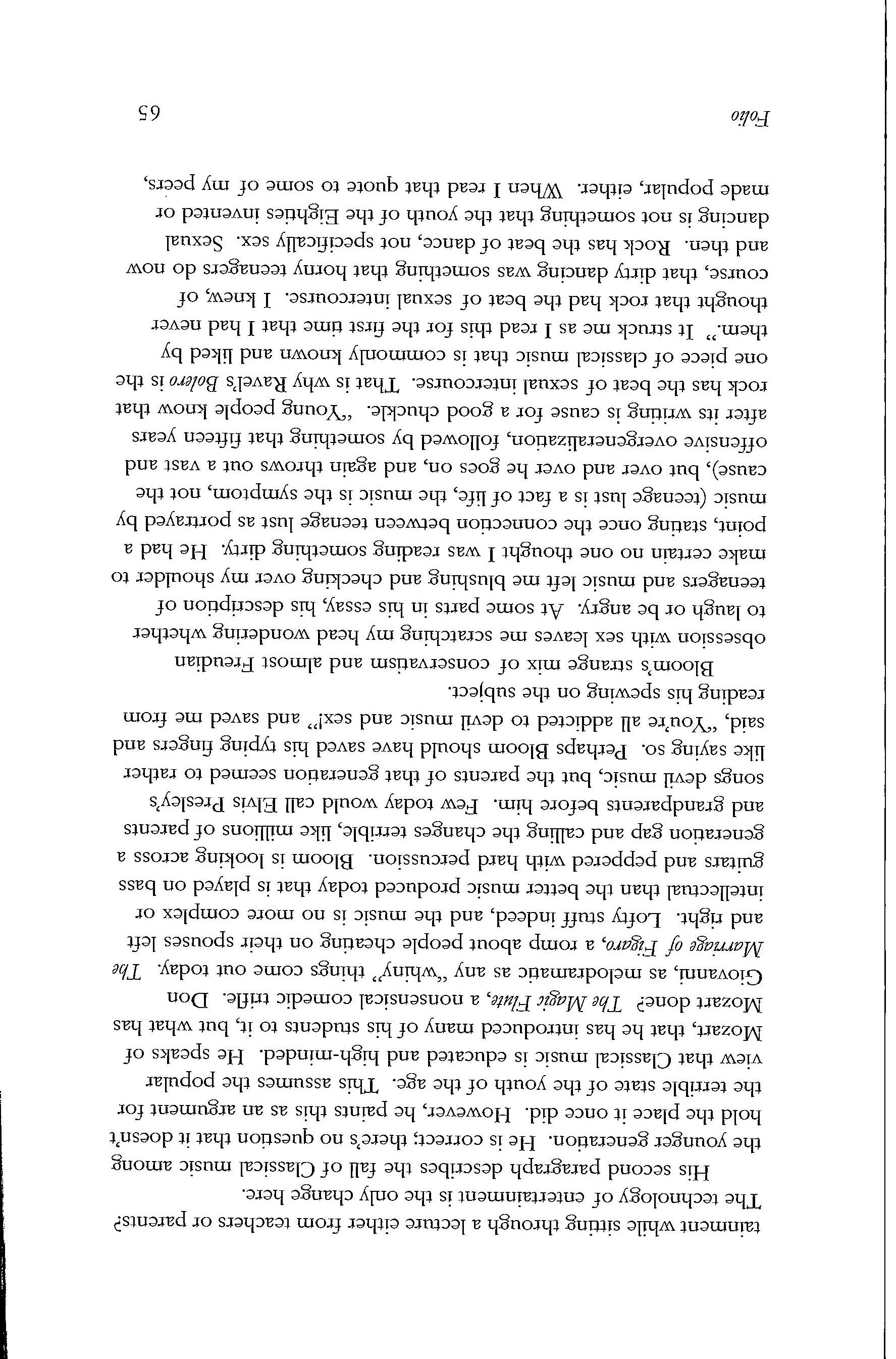
tainment while sitting through a lecture either from teachers or parents?
The technology of entertainment is the only change here.
His second paragraph describes the fall of Classical music among the younger generation. He is correct; there's no question that it doesn't hold the place it once did. However, he paints this as an argument for the terrible state of the youth of the age. This assumes the popular view that Classical music is educated and high-minded. He speaks of Mozart, that he has introduced many of his students to it, but what has Mozart done? The Magic Flute, a nonsensical comedic trifle. Don Giovanni, as melodramatic as any "whiny" things come out today. The Marriage of Figaro, a romp about people cheating on their spouses left and right. Lofty stuff indeed, and the music is no more complex or intellectual than the better music produced today that is played on bass guitars and peppered with hard percussion. Bloom is looking across a generation gap and calling the changes terrible, like millions of parents and grandparents before him. Few today would call Elvis Presley's songs devil music, but the parents of that generation seemed to rather like saying so. Perhaps Bloom should have saved his typing fingers and said, "You're all addicted to devil music and sex!" and saved me from reading his spewing on the subject.
Bloom's strange mix of conservatism and almost Freudian obsession with sex leaves me scratching my head wondering whether to laugh or be angry. At some parts in his essay, his description of teenagers and music left me blushing and checking over my shoulder to make certain no one thought I was reading something dirty. He had a point, stating once the connection between teenage lust as portrayed by music (teenage lust is a fact of life, the music is the symptom, not the cause), but over and over he goes on, and again throws out a vast and offensive overgeneralization, followed by something that fifteen years after its writing is cause for a good chuckle. "Young people know that rock has the beat of sexual intercourse. That is why Ravel's Bolero is the one piece of classical music that is commonly known and liked by them." It struck me as I read this for the first time that I had never thought that rock had the beat of sexual intercourse. I knew, of course, that dirty dancing was something that horny teenagers do now and then. Rock has the beat of dance, not specifically sex. Sexual dancing is not something that the youth of the Eighties invented or made popular, either. When I read that quote to some of my peers,
65
Folio

the most common response was a look of bewilderment, then a smirk and something along the lines of, "I guess so, but I never thought of that," or "Yeah, but that didn't occur to me until I was seventeen." No matter what generation you speak of, almost all seventeen year olds have been acquainted with the implications of sex in high school or elsewhere despite music. And Bolero? I had heard pieces of it throughout my life and never thought "sex." The thought of that work being sexual is riotous.
Bloom also states that rock is more detrimental to youth than pornography (46), a statement that leaves me speechless. I can't begin to guess where this assertion comes from, be it naivety of the nature of pornography or Bloom's determination to make rock music look as terrible as he can. This statement, more than any other, shows that Bloom is writing something that sounds intellectual and powerful on an issue that, when it comes right down to it, he has no firsthand knowledge of. It would be similar to me writing a moving piece about the horror that is the Russian culture. No doubt the Russians would have something to say about that, just like I have a spiky bone to pick with Bloom.
I will not debate that rock music goes too far in some instances. Marilyn Manson (a modern-day version of Mick Jagger that Bloom decries) is a deserving place to point a finger and say yuck. Some modern music is flatly too sexual or violent for young ears. Closer, Nine Inch Nails, is a good example, and an instance where parental control should come into the issue.
He lets the fact that he is looking through "old fogey" glasses through by saying, ''Jagger has begun to fade. Whether Michael Jackson, Prince, or Boy George can take his place is uncertain. They are even weirder than he is" (51). This seems to be almost a direct quote from my grandfather with names changed. How is Michael Jackson weirder than Jagger? I never heard of any of those three being openly satanistic or writing songs for serial killers. Michael Jackson had a fascinating fashion sense, certainly. But, because Jackson is farther down the timeline that Bloom has already decided is leading downhill, it only follows that Jackson is stranger than Jagger. The backward logic here is quite stimulating.
Bloom's time honored conservative traditions are being shaken here. It is a fact of adolescence throughout the ages that the younger
Folio 66

generation will rebel and push the envelope as far as they can, but he ignores it as if the first occurrence of this was in the Eighties. It is all that his arguments boil down to. Of course we should be better educated, but the problems with the American educational system have nothing to do with rock. Since Bloom has lengthily stated the position of millions of parents and grandparents since the dawn of civilization, I will ask him the question that millions of youth have responded with: What is growing up if we forever kiss up to the views of our parents without a stage of rebellion and thinking over the fundamentals of what we are taught?
Works Cited
Bloom, Alan. "Music." The Mercury Reader. Compiled by the Salt Lake Community College Department of English. Boston: Pearson Custom Publishing, 2001. 40-53
67
Folio

Locked
James Bodden
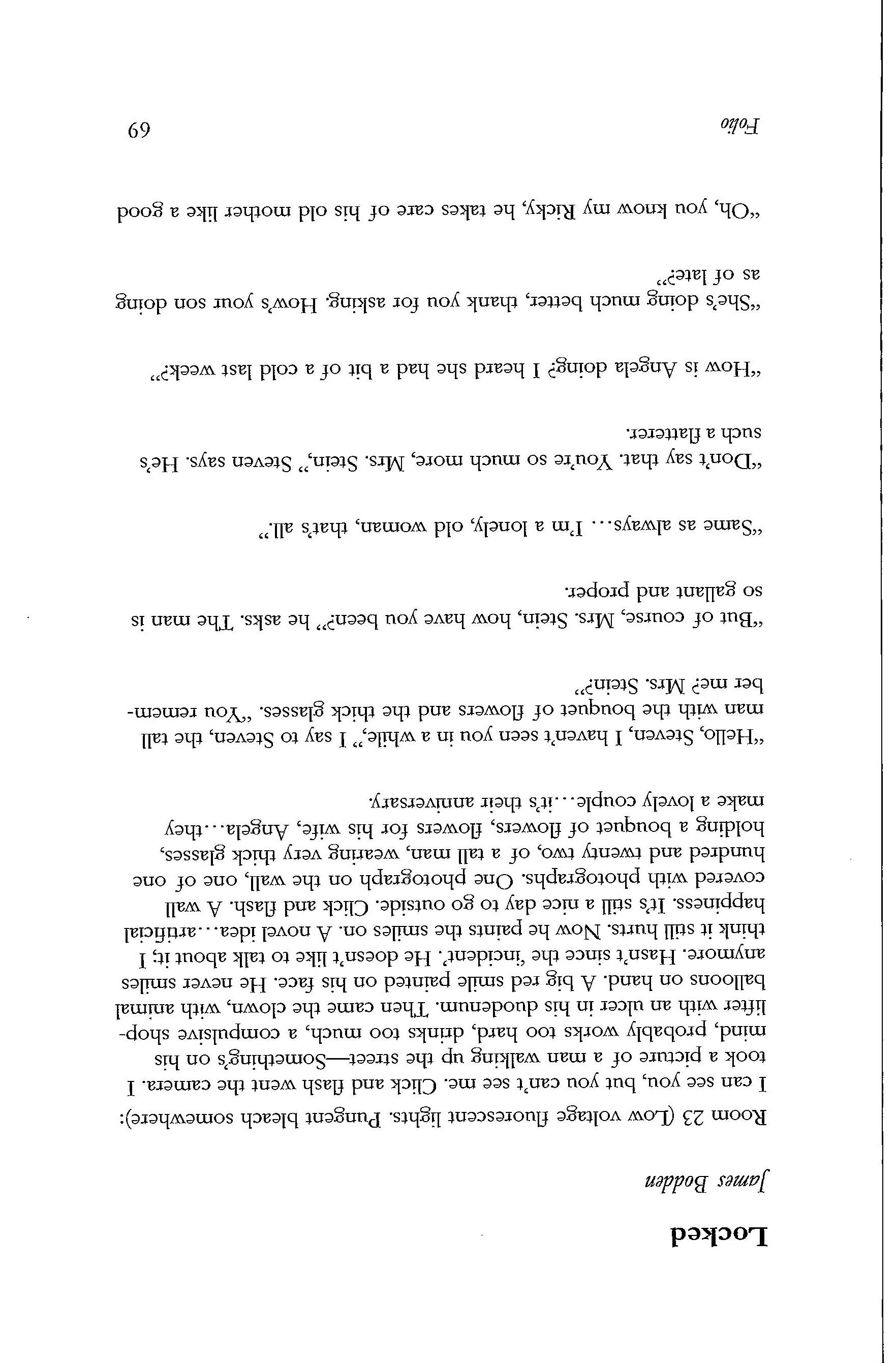
Room 23 (Low voltage fluorescent lights. Pungent bleach somewhere):
I can see you, but you can't see me. Click and flash went the camera. I took a picture of a man walking up the street-Something's on his mind, probably works too hard, drinks too much, a compulsive shoplifter with an ulcer in his duodenum. Then came the clown, with animal balloons on hand. A big red smile painted on his face. He never smiles anymore. Hasn't since the 'incident'. He doesn't like to talk about it; I think it still hurts. Now he paints the smiles on. A novel idea ... artificial happiness. It's still a nice day to go outside. Click and flash. A wall covered with photographs. One photograph on the wall, one of one hundred and twenty two, of a tall man, wearing very thick glasses, holding a bouquet of flowers, flowers for his wife, Angela ... they make a lovely couple .it's their anniversary.
"Hello, Steven, I haven't seen you in a while," I say to Steven, the tall man with the bouquet of flowers and the thick glasses. "You remember me? Mrs. Stein?"
"But of course, Mrs. Stein, how have you been?" he asks. The man is so gallant and proper.
"Same as always ... I'm a lonely, old woman, that's all."
"Don't say that. You're so much more, Mrs. Stein," Steven says. He's such a flatterer.
"How is Angela doing? I heard she had a bit of a cold last week?"
"She's doing much better, thank you for asking. How's your son doing as of late?"
"Oh, you know my Ricky, he takes care of his old mother like a good
Folio 69
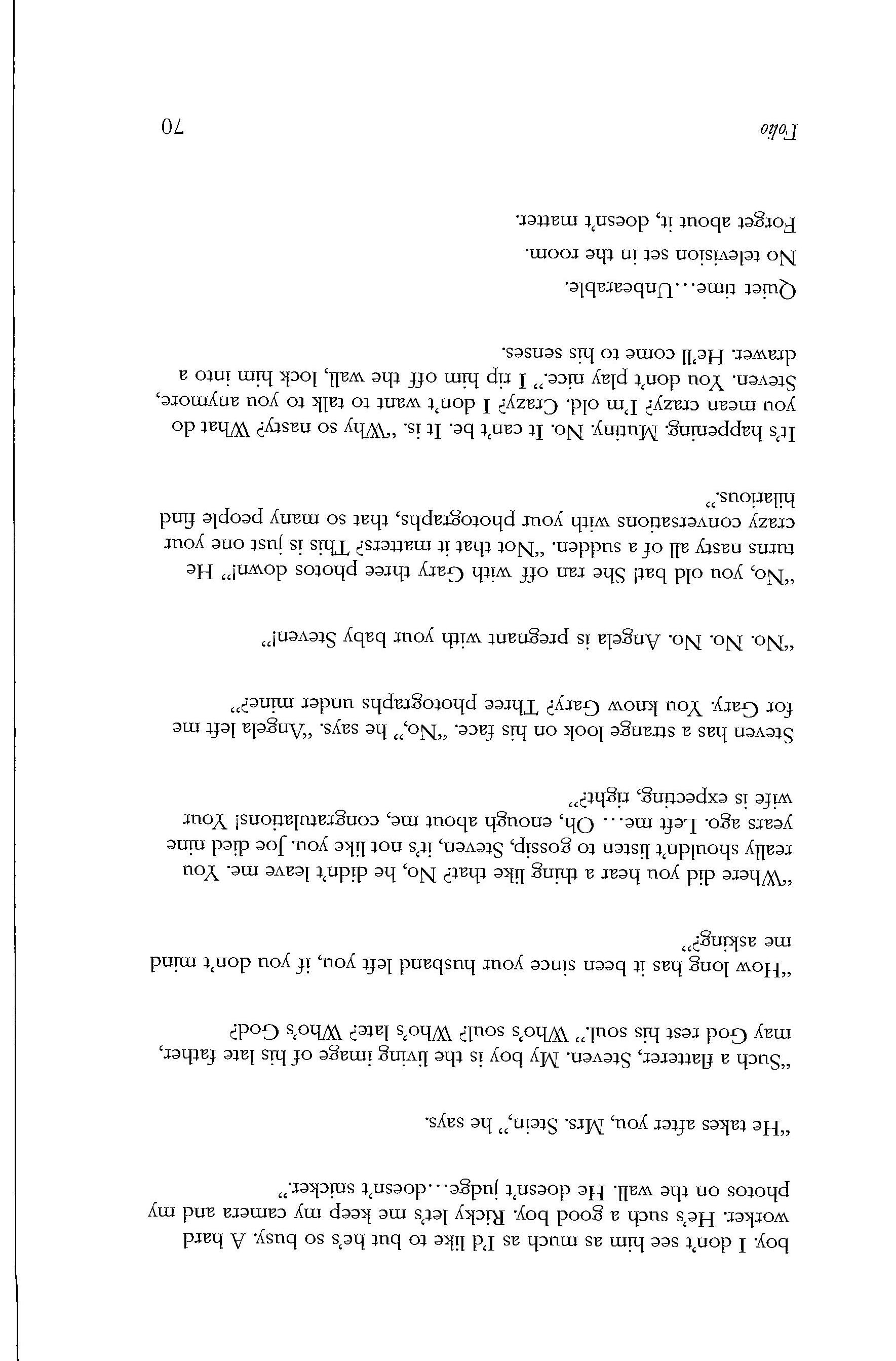
boy. I don't see him as much as I'd like to but he's so busy. A hard worker. He's such a good boy. Ricky let's me keep my camera and my photos on the wall. He doesn't judge ... doesn't snicker."
"He takes after you, Mrs. Stein," he says.
"Such a flatterer, Steven. My boy is the living image of his late father, may God rest his soul." Who's soul? Who's late? Who's God?
"How long has it been since your husband left you, if you don't mind me asking?"
'Where did you hear a thing like that? No, he didn't leave me. You really shouldn't listen to gossip, Steven, it's not like you. Joe died nine years ago. Left me ... Oh, enough about me, congratulations! Your wife is expecting, right?"
Steven has a strange look on his face. "No," he says. ''Angela left me for Gary. You know Gary? Three photographs under mine?"
"No. No. No. Angela is pregnant with your baby Steven!"
"No, you old bat! She ran off with Gary three photos down!" He turns nasty all of a sudden. "Not that it matters? This is just one your crazy conversations with your photographs, that so many people find hilarious."
It's happening. Mutiny. No. It can't be. It is. 'Why so nasty? What do you mean crazy? I'm old. Crazy? I don't want to talk to you anymore, Steven. You don't play nice." I rip him off the wall, lock him into a drawer. He'll come to his senses.
Quiet time ... Unbearable. No television set in the room.
Forget about it, doesn't matter.
Folio 70

Truth is subjective.
"It was some story. You should really watch the evening news. A poor old woman robbed at knifepoint. Apparently everybody's armed these days."
No answer.
Still photography
The silent treatment.
They're all a bunch of ingrates!
There's a cloudy mirror on my dresser. Should I take a look?
Surprise ... I'm old. Wrinkled. Alone. Turn a knob and see it hold still. Disappointing. Don't turn knobs. You'll smile more. I take black eyeliner from the same drawer Steven is locked in, the same room where I'm locked and I trace my wrinkles. Trace over cheeks, chin, mouth, and eyes. Black angry lines. Done. Surprise ... I'm in the mirror again. Not Mrs. Stein. Not at all. Black stripes on my face-A tigress. A lean, lethal tigress.
Salivating.
Hungry.
Caged.
Break loose.
Lek my paws.
My teeth turn white and sharp.
Foaming at the mouth.
Run through the open savannah ...
Hide behind the dry, weeds and grass.
Gazelles, zebras, a limp buffalo.
I snarl, "ROOARRR!"
Pounce on a buffalo's back.
Sink my teeth on his tough neck.
Tear through flesh.
His defeated squeal.
Folio 71

Chew through bone.
Purr back to my bed.
Bloody.. .
Meat ... Meat ... Need red meat.
72
Folio
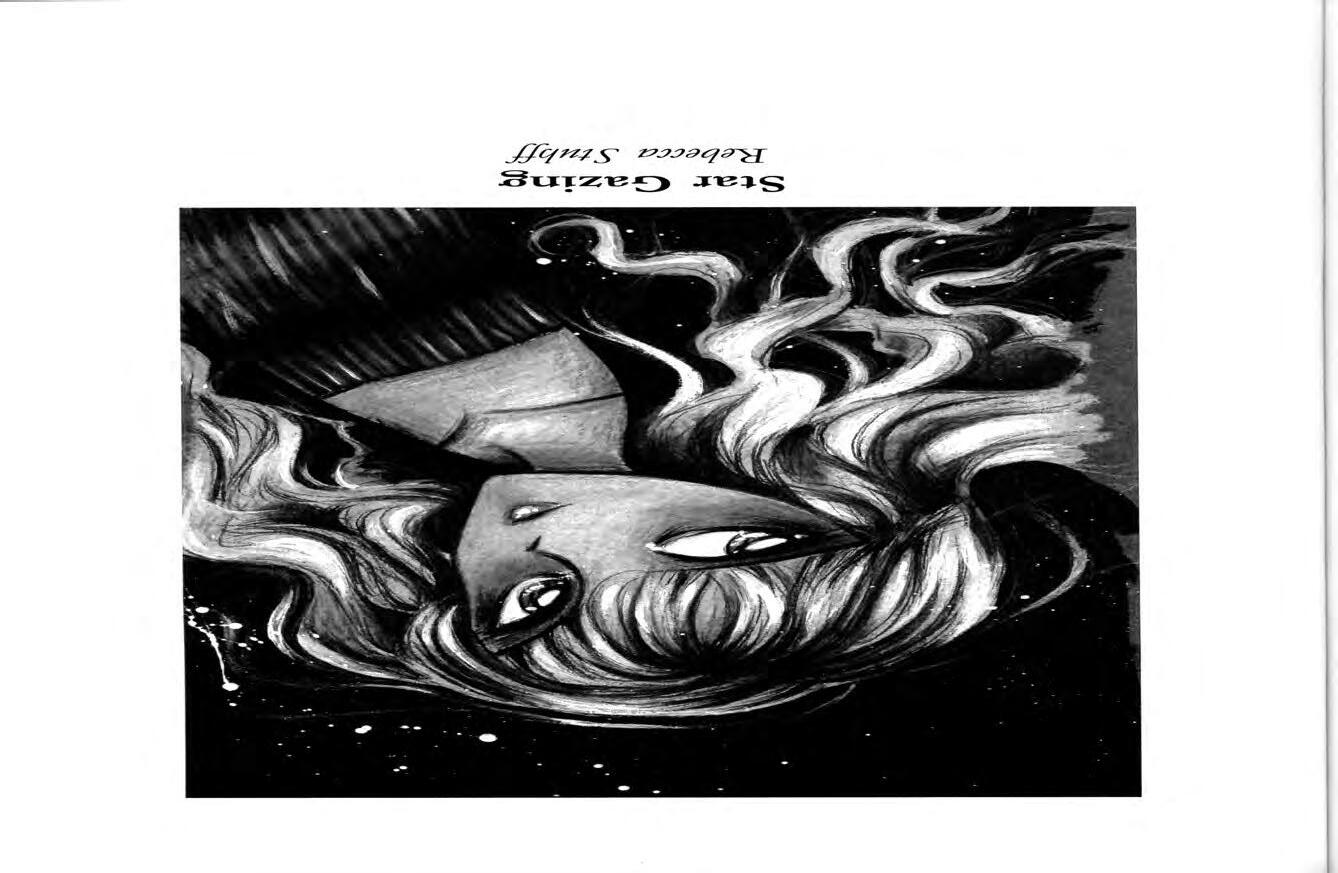

Earth College
Crystal Lowder
If you look closely at the northeastern stars at 11 p.m. anywhere on any night in the world, you might know that a college exists, in that vicinity, oh, maybe 534 miles from the earth. It's like a big Camp for Kids if you will: free room, free food, free education, so long as your parents pay the $1,030 for shuttling you off the planet (not including travel costs to Florida or Russia or wherever the "shuttle" is leaving your Freshman year).
If you keep your grades up at the College, that is, above 4.0 on a 7.0 scale, your parents won't have to pay the $1,030,000 tuition fee. Earth College's grading scale is like ours--a 4.0 is an A--but you can do better if you want, and you will want.
The school's highly selective admissions committee takes students from every country for the same reasons any other school does except for academic standing. Forget grades; students have to answer essay questions full-paged, single-spaced, font 11, with perfect grammar or they're immediately disqualified. Oh, the questions aren't hard: How do you study? Why do you study? Do you think you're a humble person? But, as there are so many like questions, you can expect to mail a novellength application by the time you're done filling one out.
Anyway, few students get admitted into this college, but if you're one of the lucky ones, here are just a few things you will want to do and keep in mind before you leave home in preparation for the rigorous, but prestigious, education you are about to receive. To Do list: Read the dictionary and encyclopedia cover to cover; I would recommend several different versions of each. Learn the history of every country on the planet Earth. I<:now several--at least five--modern languages and expect to learn several more on your own time while you're at school.
Don't worry much about math; the college offers course numbers as low as 1050. And you don't need to know the decimal system at all; just the binary.
To I<:now: Once at school you'll be expected to take notes on everything the instructors say. If you've planned your semester carefully,
Folio 74
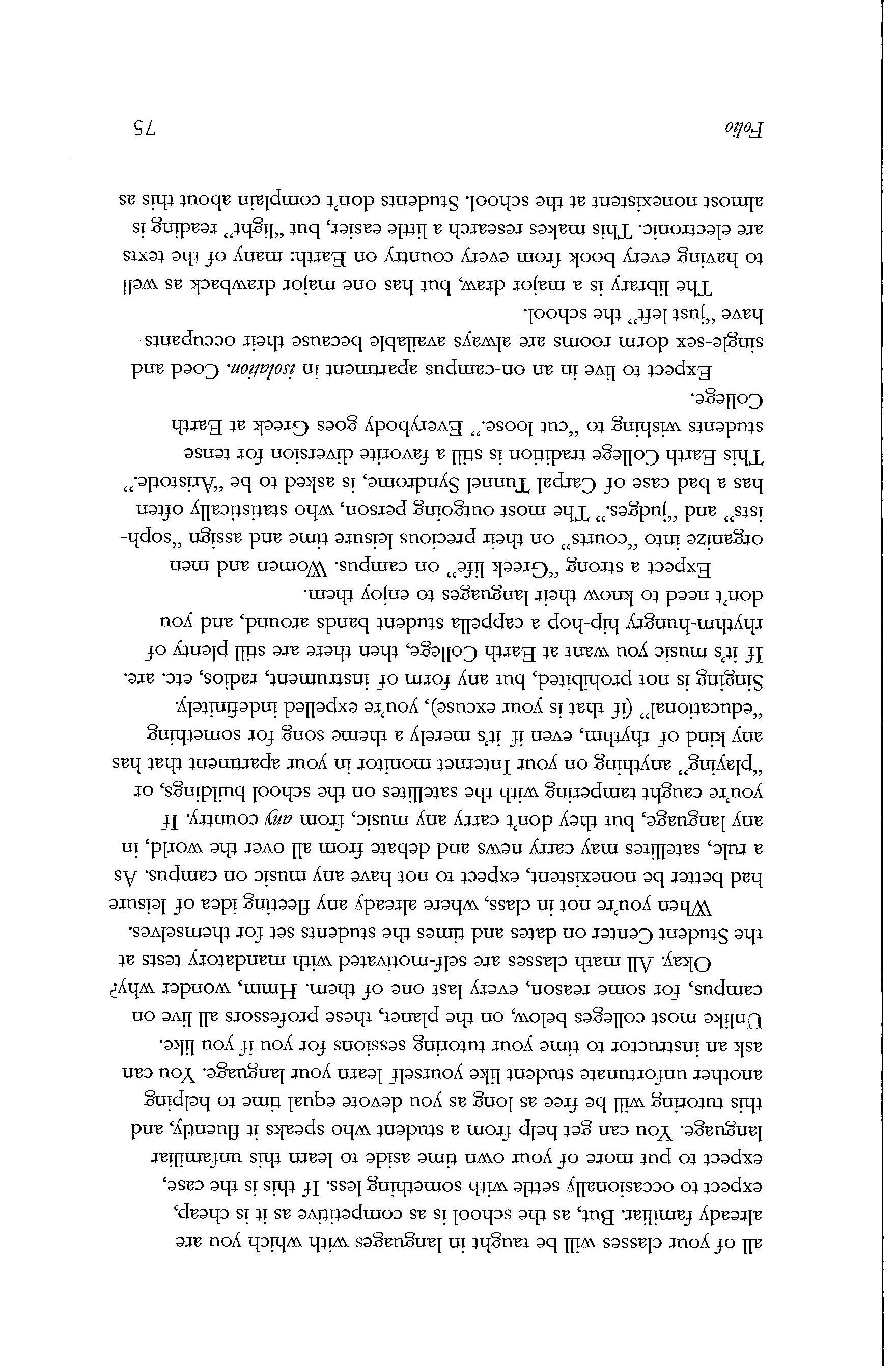
all of your classes will be taught in languages with which you are already familiar. But, as the school is as competitive as it is cheap, expect to occasionally settle with something less. If this is the case, expect to put more of your own time aside to learn this unfamiliar language. You can get help from a student who speaks it fluently, and this tutoring will be free as long as you devote equal time to helping another unfortunate student like yourself learn your language. You can ask an instructor to time your tutoring sessions for you if you like. Unlike most colleges below, on the planet, these professors all live on campus, for some reason, every last one of them. Hmm, wonder why?
Okay. All math classes are self-motivated with mandatory tests at the Student Center on dates and times the students set for themselves.
When you're not in class, where already any fleeting idea of leisure had better be nonexistent, expect to not have any music on campus. As a rule, satellites may carry news and debate from all over the world, in any language, but they don't carry any music, from a;ry country. If you're caught tampering with the satellites on the school buildings, or "playing" anything on your Internet monitor in your apartment that has any kind of rhythm, even if it's merely a theme song for something "educational" (if that is your excuse), you're expelled indefinitely.
Singing is not prohibited, but any form of instrument, radios, etc. are. If it's music you want at Earth College, then there are still plenty of rhythm-hungry hip-hop a cappella student bands around, and you don't need to know their languages to enjoy them.
Expect a strong "Greek life" on campus. Women and men organize into "courts" on their precious leisure time and assign "sophists" and "judges." The most outgoing person, who statistically often has a bad case of Carpal Tunnel Syndrome, is asked to be ''Aristotle." This Earth College tradition is still a favorite diversion for tense students wishing to "cut loose." Everybody goes Greek at Earth College.
Expect to live in an on-campus apartment in isolation. Coed and single-sex dorm rooms are always available because their occupants have "just left" the school.
The library is a major draw, but has one major drawback as well to having every book from every country on Earth: many of the texts are electronic. This makes research a little easier, but "light" reading is almost nonexistent at the school. Students don't complain about tlus as
Folio 75
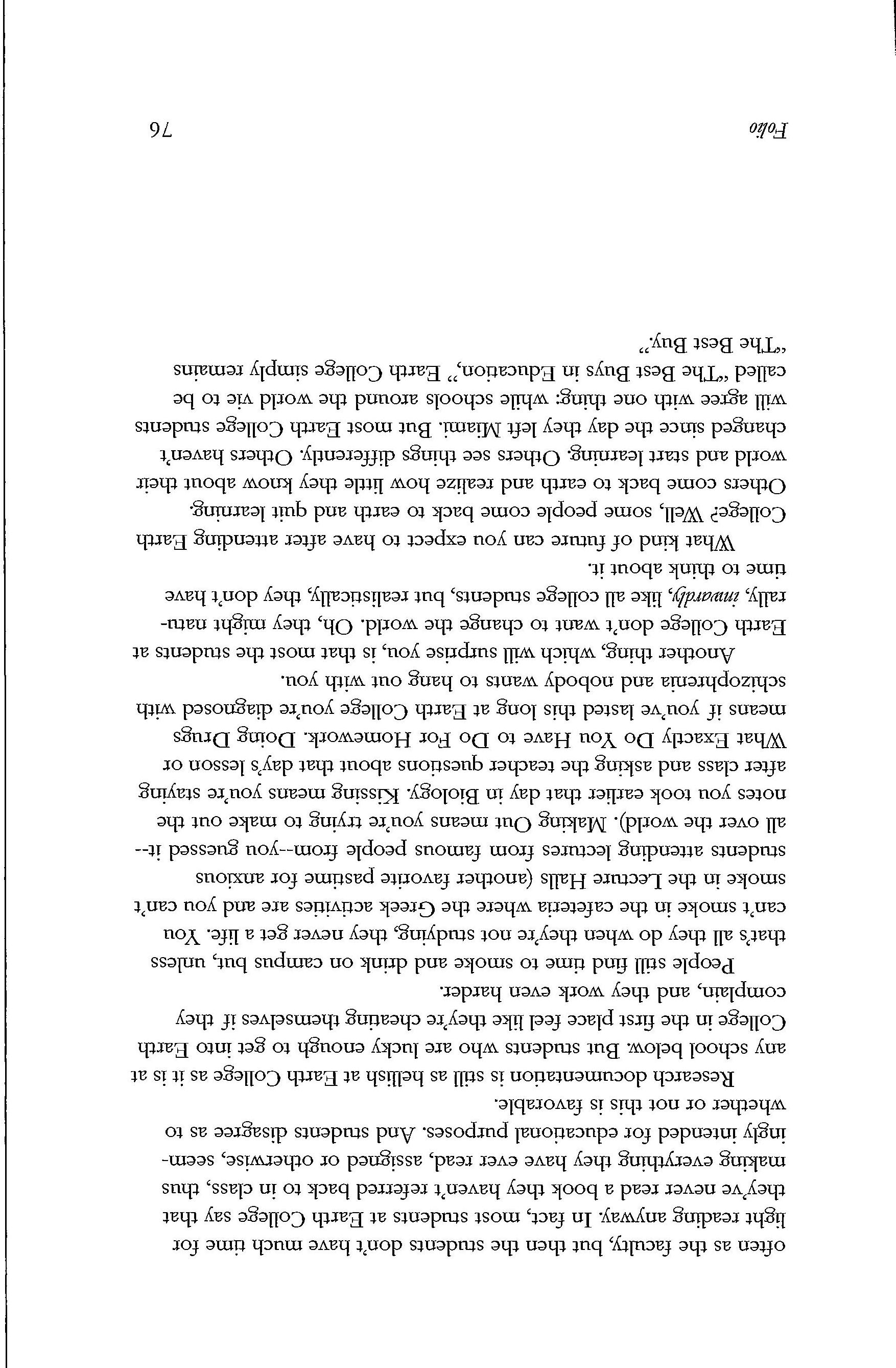
often as the faculty, but then the students don't have much time for light reading anyway. In fact, most students at Earth College say that they've never read a book they haven't referred back to in class, thus making everything they have ever read, assigned or otherwise, seemingly intended for educational purposes. And students disagree as to whether or not this is favorable.
Research documentation is still as hellish at Earth College as it is at any school below. But students who are lucky enough to get into Earth College in the first place feel like they're cheating themselves if they complain, and they work even harder.
People still find time to smoke and drink on campus but, unless that's all they do when they're not studying, they never get a life. You can't smoke in the cafeteria where the Greek activities are and you can't smoke in the Lecture Halls (another favorite pastime for anxious students attending lectures from famous people from--you guessed it-all over the world). Making Out means you're trying to make out the notes you took earlier that day in Biology. Kissing means you're staying after class and asking the teacher questions about that day's lesson or What Exactly Do You Have to Do For Homework. Doing Drugs means if you've lasted this long at Earth College you're diagnosed with schizophrenia and nobody wants to hang out with you.
Another thing, which will surprise you, is that most the students at Earth College don't want to change the world. Oh, they might naturally, inwardfy, like all college students, but realistically, they don't have time to think about it.
What kind of future can you expect to have after attending Earth College? Well, some people come back to earth and quit learning. Others come back to earth and realize how little they know about their world and start learning. Others see things differently. Others haven't changed since the day they left Miami. But most Earth College students will agree with one thing: while schools around the world vie to be called "The Best Buys in Education," Earth College simply remains "The Best Buy."
Folio 76
Jumping the Shot-Gun
Susanne Ostler
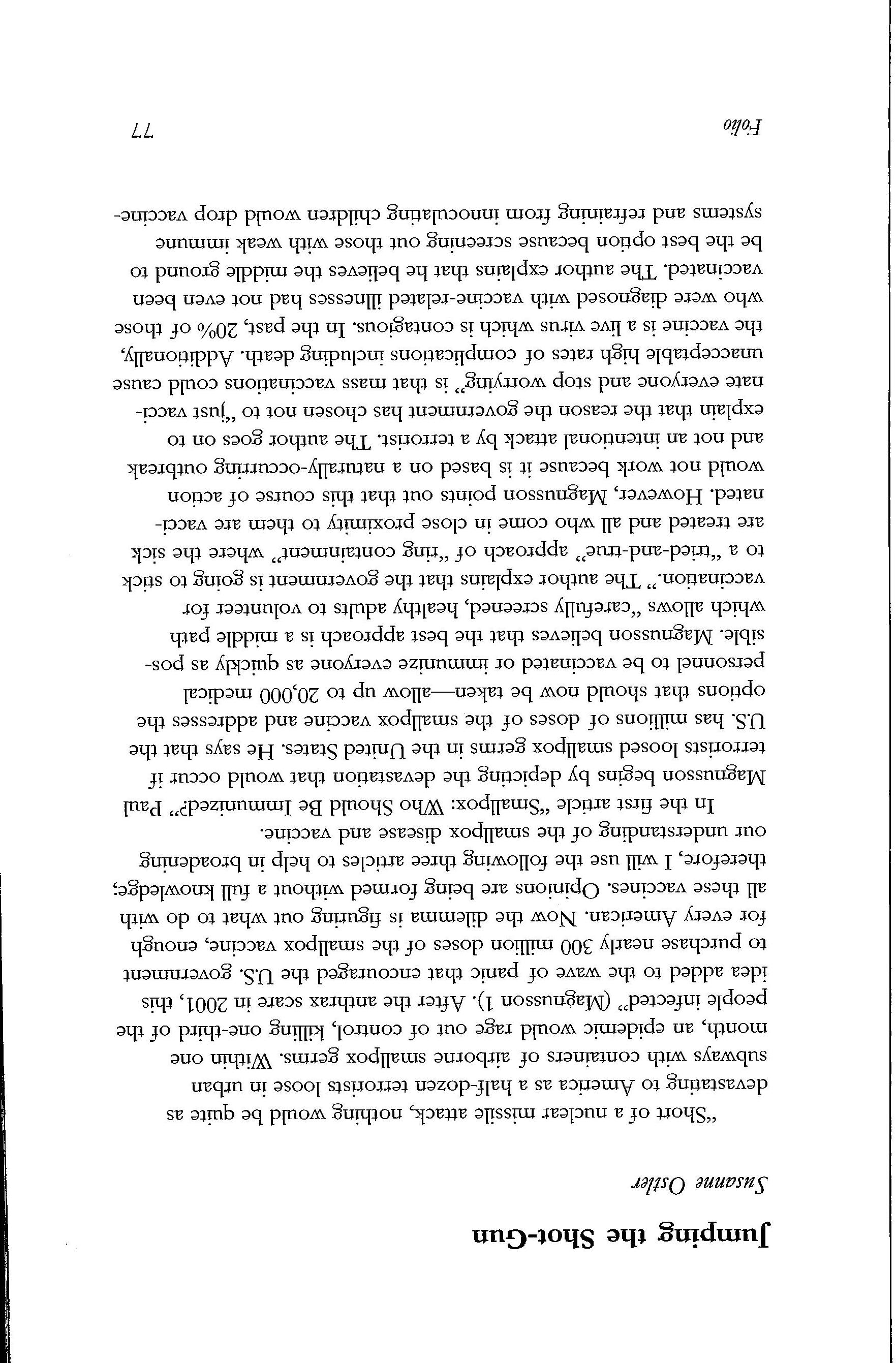
"Short of a nuclear missile attack, nothing would be quite as devastating to America as a half-dozen terrorists loose in urban subways with containers of airborne smallpox germs. Within one month, an epidemic would rage out of control, killing one-third of the people infected" (Magnusson 1). After the anthrax scare in 2001, this idea added to the wave of panic that encouraged the U.S. government to purchase nearly 300 million doses of the smallpox vaccine, enough for every American. Now the dilemma is figuring out what to do with all these vaccines. Opinions are being formed without a full knowledge; therefore, I will use the following three articles to help in broadening our understanding of the smallpox disease and vaccine.
In the first article "Smallpox: Who Should Be Immunized?" Paul Magnusson begins by depicting the devastation that would occur if terrorists loosed smallpox germs in the United States. He says that the U.S. has millions of doses of the. smallpox vaccine and addresses the options that should now be taken-allow up to 20,000 medical personnel to be vaccinated or immunize everyone as quickly as possible. Magnusson believes that the best approach is a middle path which allows "carefully screened, healthy adults to volunteer for vaccination." The author explains that the government is going to stick to a "tried-and-true" approach of "ring containment" where the sick are treated and all who come in close proximity to them are vaccinated. However, Magnusson points out that this course of action would not work because it is based on a naturally-occurring outbreak and not an intentional attack by a terrorist. The author goes on to explain that the reason the government has chosen not to "just vaccinate everyone and stop worrying" is that mass vaccinations could cause unacceptable high rates of complications including death. Additionally, the vaccine is a live virus which is contagious. In the past, 20% of those who were diagnosed with vaccine-related illnesses had not even been vaccinated. The author explains that he believes the middle ground to be the best option because screening out those with weak immune systems and refraining from innoculating children would drop vaccine-
Folio 77
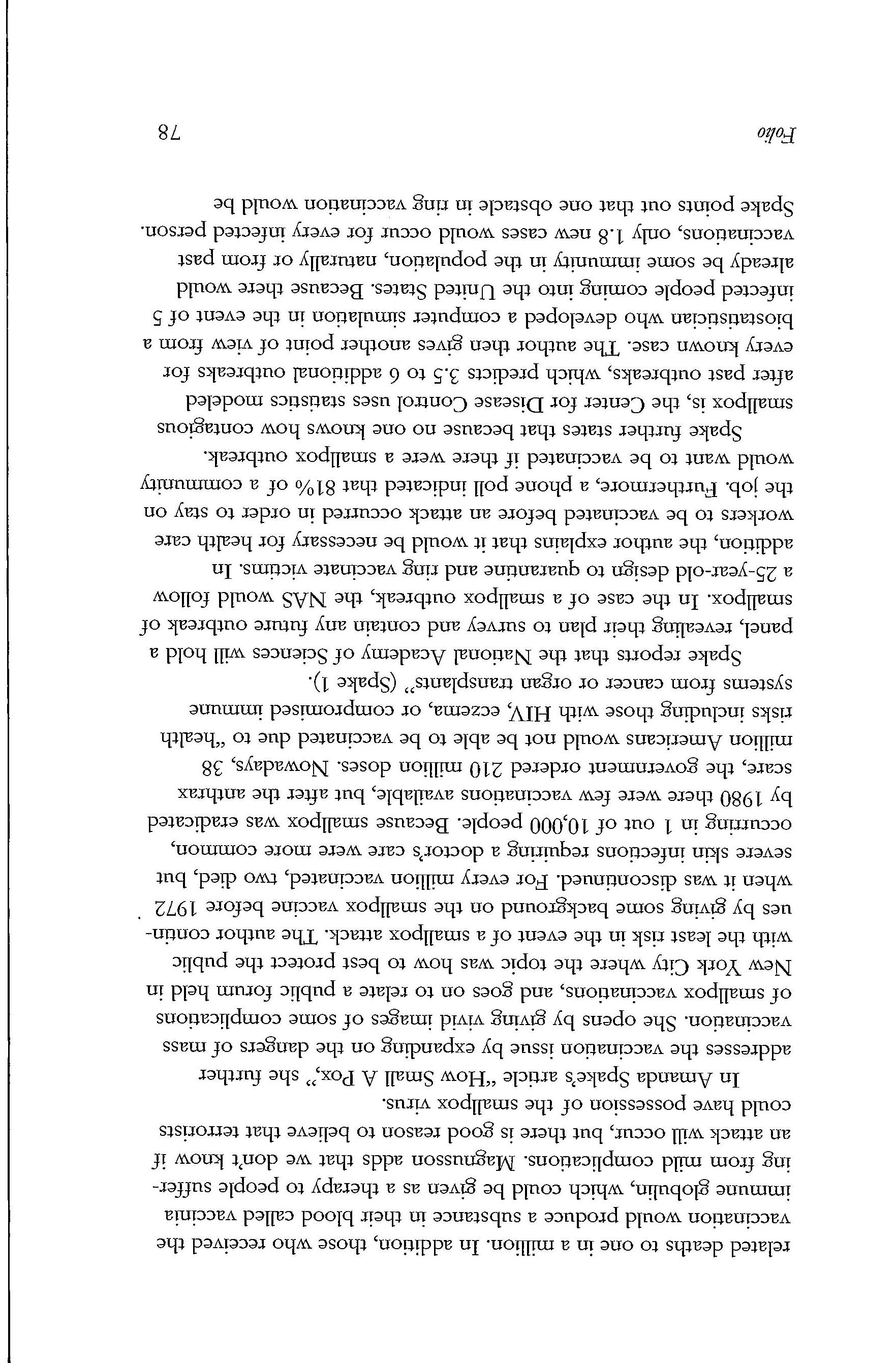
related deaths to one in a million. In addition, those who received the vaccination would produce a substance in their blood called vaccinia immune globulin, which could be given as a therapy to people suffering from mild complications. Magnusson adds that we don't know if an attack will occur, but there is good reason to believe that terrorists could have possession of the smallpox virus.
In Amanda Spake's article "How Small A Pox," she further addresses the vaccination issue by expanding on the dangers of mass vaccination. She opens by giving vivid images of some complications of smallpox vaccinations, and goes on to relate a public forum held in New York City where the topic was how to best protect the public with the least risk in the event of a smallpox attack. The author continues by giving some background on the smallpox vaccine before 1972 when it was discontinued. For every million vaccinated, two died, but severe skin infections requiring a doctor's care were more common, occurring in 1 out of 10,000 people. Because smallpox was eradicated by 1980 there were few vaccinations available, but after the anthrax scare, the government ordered 210 million doses. Nowadays, 38 million Americans would not be able to be vaccinated due to "health risks including those with HN, eczema, or compromised immune systems from cancer or organ transplants" (Spake 1).
Spake reports that the National Academy of Sciences will hold a panel, revealing their plan to survey and contain any future outbreak of smallpox. In the case of a smallpox outbreak, the NAS would follow a 25-year-old design to quarantine and ring vaccinate victims. In addition, the author explains that it would be necessary for health care workers to be vaccinated before an attack occurred in order to stay on the job. Furthermore, a phone poll indicated that 81 % of a community would want to be vaccinated if there were a smallpox outbreak.
Spake further states that because no one knows how contagious smallpox is, the Center for Disease Control uses statistics modeled after past outbreaks, which predicts 3.5 to 6 additional outbreaks for every known case. The author then gives another point of view from a biostatistician who developed a computer simulation in the event of 5 infected people coming into the United States. Because there would already be some immunity in the population, naturally or from past vaccinations, only 1.8 new cases would occur for every infected person. Spake points out that one obstacle in ring vaccination would be
Folio 78

identifying and vaccinating all those who came in contact with an infected person, especially if that person visited many populated areas in succession.
The third article is a "Report of the CDC Public Forum on Smallpox" by Dr. Sherri Tenpenny. The author gives an overview of what was discussed amongst the approximately 60 people who attended a forum that the Center for Disease Control held to clear up some misconceptions about smallpox. She points out that the CDC admits that mass vaccination is not necessarily the answer, and advises great caution regarding vaccine use. The CDC says that greater emphasis will be placed on isolation, not just vaccination, if an outbreak occurs. They also announced that smallpox is not a highly contagious disease like measles. The infected person is only contagious after the rash has shown up, which means that there is no time frame in which the victim is contagious without knowing they have the disease. The disease is "transmitted slowly and only after prolonged, direct, face-toface contact," which the CDC defined as within 6- 7 feet and for more than 7 days. Tenpenny goes on to report that average transmission rates are less than 1 person infected per infectious person, and that "the scenario in which a terrorist infects himself and walks through a city spreading the disease just wouldn't happen, even in population dense areas" (Tenpenny 2).
She explains that the 30% death rate for smallpox is based on old data. "Most of the cases that died were in Bangladesh and Central Africa" where they did not have advanced medical care at that time. In addition, the 30% death rate is actually caused by electrolyte imbalances and possibly renal (kidney) disease, not the smallpox infection itself. This means that people died from potentially treatable complications of this infection, not from the actual smallpox disease.
After giving background on the disease, Tenpenny then addresses the problems with the smallpox vaccine. She explains that there would be many people who would be unable to receive the smallpox vaccine. More than 25% of our population would be at risk for serious complications, including death, not only from the vaccine but also from coming in direct contact with a vaccinated individual. This is due to the fact that many people's immune systems are not strong enough to withstand the vaccination. Included in the 25% are those with a current or past history of eczema, cancer, diagnosed and undiagnosed
Folio 79
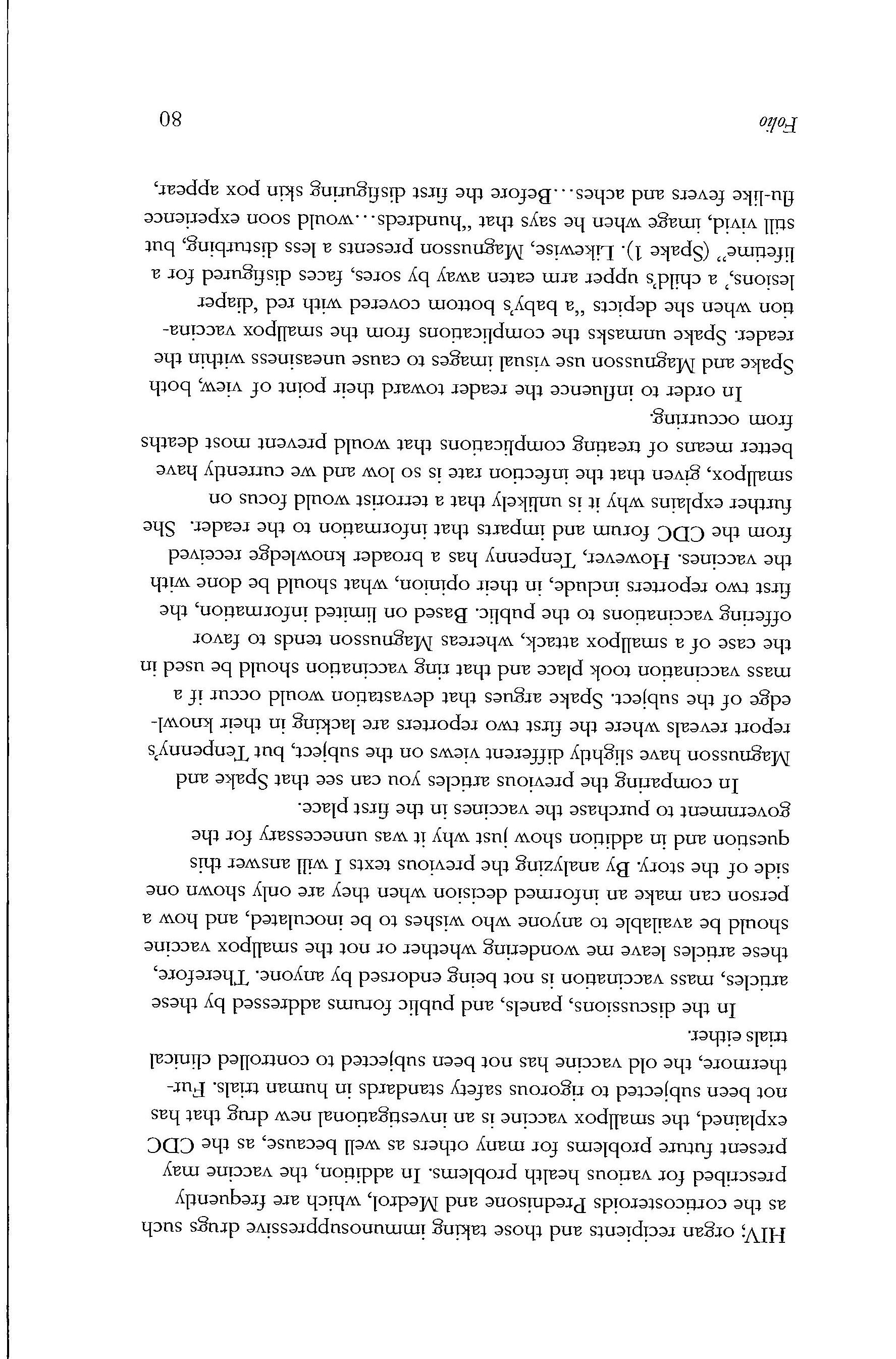
HIV; organ recipients and those taking immunosuppressive drugs such as the corticosteroids Prednisone and Medrol, which are frequently prescribed for various health problems. In addition, the vaccine may present future problems for many others as well because, as the CDC explained, the smallpox vaccine is an investigational new drug that has not been subjected to rigorous safety standards in human trials. Furthermore, the old vaccine has not been subjected to controlled clinical trials either.
In the discussions, panels, and public forums addressed by these articles, mass vaccination is not being endorsed by anyone. Therefore, these articles leave me wondering whether or not the smallpox vaccine should be available to anyone who wishes to be inoculated, and how a person can make an informed decision when they are only shown one side of the story. By analyzing the previous texts I will answer this question and in addition show just why it was unnecessary for the government to purchase the vaccines in the first place.
In comparing the previous articles you can see that Spake and Magnusson have slightly different views on the subject, but Tenpenny's report reveals where the first two reporters are lacking in their knowledge of the subject. Spake argues that devastation would occur if a mass vaccination took place and that ring vaccination should be used in the case of a smallpox attack, whereas Magnusson tends to favor offering vaccinations to the public. Based on limited information, the first two reporters include, in their opinion, what should be done with the vaccines. However, Tenpenny has a broader knowledge received from the CDC forum and imparts that information to the reader. She further explains why it is unlikely that a terrorist would focus on smallpox, given that the infection rate is so low and we currently have better means of treating complications that would prevent most deaths from occurring.
In order to influence the reader toward their point of view, both Spake and Magnusson use visual images to cause uneasiness within the reader. Spake unmasks the complications from the smallpox vaccination when she depicts "a baby's bottom covered with red 'diaper lesions,' a child's upper arm eaten away by sores, faces disfigured for a lifetime" (Spake 1). Likewise, Magnusson presents a less disturbing, but still vivid, image when he says that "hundreds would soon experience flu-like fevers and aches Before the first disfiguring skin pox appear,
Folio 80

the victims would spread the deadly virus to others" (Magnusson 1).
On the contrary, Dr. Tenpenny does not use emotion to persuade the reader. She simply lays out the facts presented by the Center for Disease Control. Furthermore, the CDC's statement that the victim is not contagious until the rash appears completely undermines the accuracy of Magnusson when he stated that the virus would be spread before the skin pox appear.
It would appear that while their opinions and concerns are valid, Spake and Magnusson have a limited knowledge about the smallpox disease and vaccine. They all together left out vital information required to make an educated decision, such as the fact that the 30% smallpox death rate actually reflects deaths caused by complications that are now easily treatable, such as electrolyte imbalances and possible kidney disease. Additionally, they failed to include that the smallpox vaccine is an investigational new drug which has not been thoroughly studied. On the contrary, Dr. Tenpenny gives us this needed information by fully covering these issues. Her report calms all fears by showing that smallpox is not a reason to panic, and that additionally an attack is unlikely to occur.
When the public is not given all the information available, such as Tenpenny's report, it is impossible for them to make an informed decision. In order to understand why the public is left in ignorance, one must consider the force behind vaccine publicity. Vaccine companies such as Wyeth, Acambis, and Aventis are billion dollar industries that are protected by the National Childhood Vaccine Injury Act of 1986 (Young). This vaccine injury compensation program "is a vaccine safety and compensation system which created a no-fault compensation alternative to suing vaccine manufacturers and providers on behalf of citizens injured or killed by vaccines" (Young 18). These companies have become a billion dollar industry by the vaccination sales to doctors, who are also not held accountable for adverse reactions to vaccines. I believe that doctors do the best they can with the knowledge they have and the information that they receive. However, it seems unlikely that a doctor would be able to stay up on every bit of vaccine research that is going on when there are so many other problems that the doctor must address on a daily basis.
It is researchers who find new information; and further experimentation with and use of vaccines are revealing dangers and risks. I
Folio 81
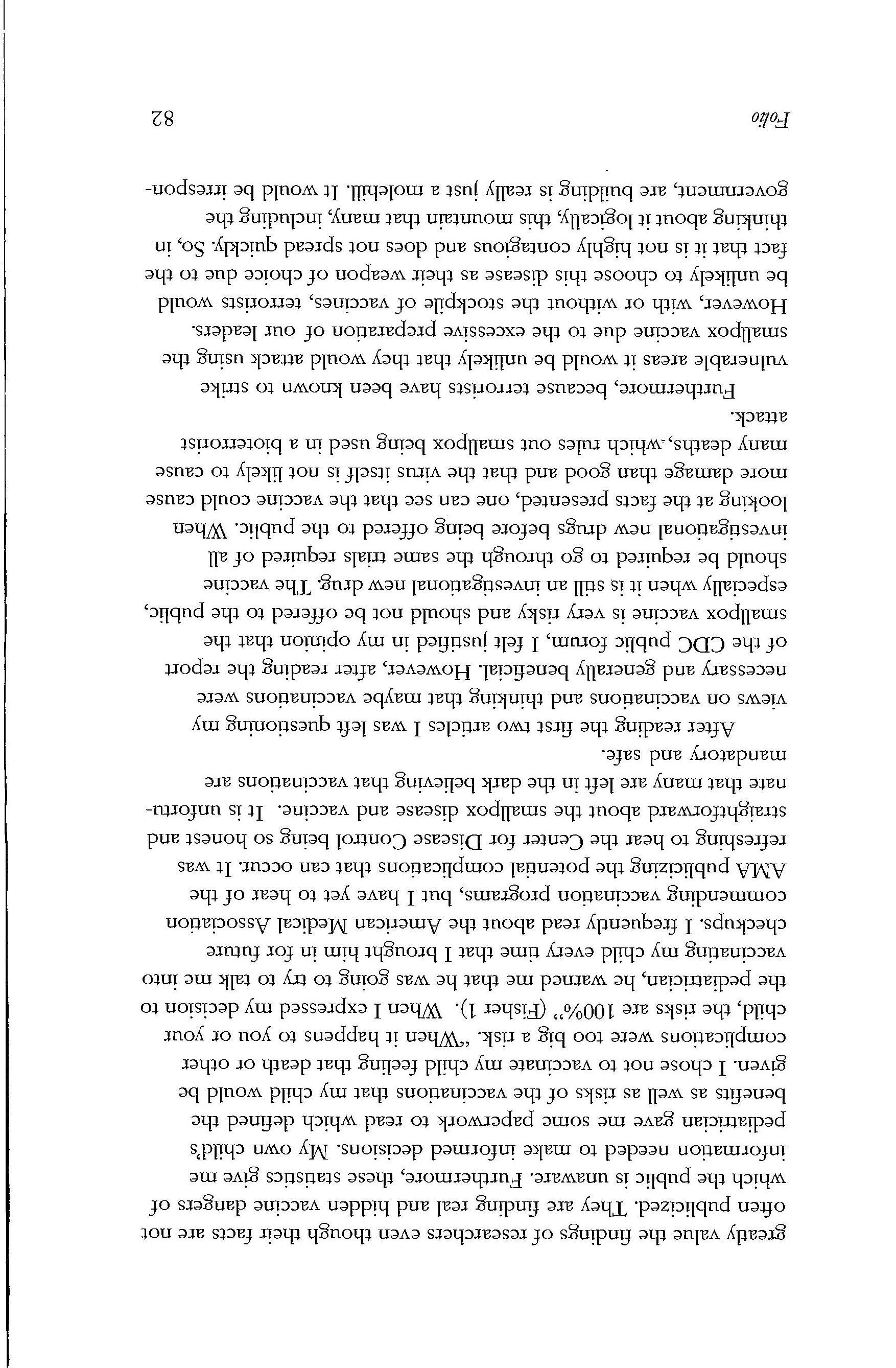
greatly value the findings of researchers even though their facts are not often publicized. They are finding real and hidden vaccine dangers of which the public is unaware. Furthermore, these statistics give me information needed to make informed decisions. My own child's pediatrician gave me some paperwork to read which defined the benefits as well as risks of the vaccinations that my child would be given. I chose not to vaccinate my child feeling that death or other complications were too big a risk. "When it happens to you or your child, the risks are 100%" (Fisher 1). When I expressed my decision to the pediatrician, he warned me that he was going to try to talk me into vaccinating my child every time that I brought him in for future checkups. I frequently read about the American Medical Association commending vaccination programs, but I have yet to hear of the AMA publicizing the potential complications that can occur. It was refreshing to hear the Center for Disease Control being so honest and straightforward about the smallpox disease and vaccine. It is unfortunate that many are left in the dark believing that vaccinations are mandatory and safe.
After reading the first two articles I was left questioning my views on vaccinations and thinking that maybe vaccinations were necessary and generally beneficial. However, after reading the report of the CDC public forum, I felt justified in my opinion that the smallpox vaccine is very risky and should not be offered to the public, especially when it is still an investigational new drug. The vaccine should be required to go through the same trials required of all investigational new drugs before being offered to the public. When looking at the facts presented, one can see that the vaccine could cause more damage than good and that the virus itself is not likely to cause many deaths, "which rules out smallpox being used in a bioterrorist attack.
Furthermore, because terrorists have been known to strike vulnerable areas it would be unlikely that they would attack using the smallpox vaccine due to the excessive preparation of our leaders. However, with or without the stockpile of vaccines, terrorists would be unlikely to choose this disease as their weapon of choice due to the fact that it is not highly contagious and does not spread quickly. So, in thinking about it logically, this mountain that many, including the government, are building is really just a molehill. It would be irrespon-
Folio 82
sible to jump the gun and put people's lives at risk by offering vaccinations to the public at this time. In addition, it is extremely important to educate yourself on important issues regardless of how convincing those in positions of power can be.
"Nightfall does not come at once, neither does oppression. In both instances, there is twilight where everything remains seemingly unchanged. And it is in such a twilight that we all must be aware of change in the air However slight .lest we become unwitting victims of the darkness" (Tenpenny 9).
Works Cited
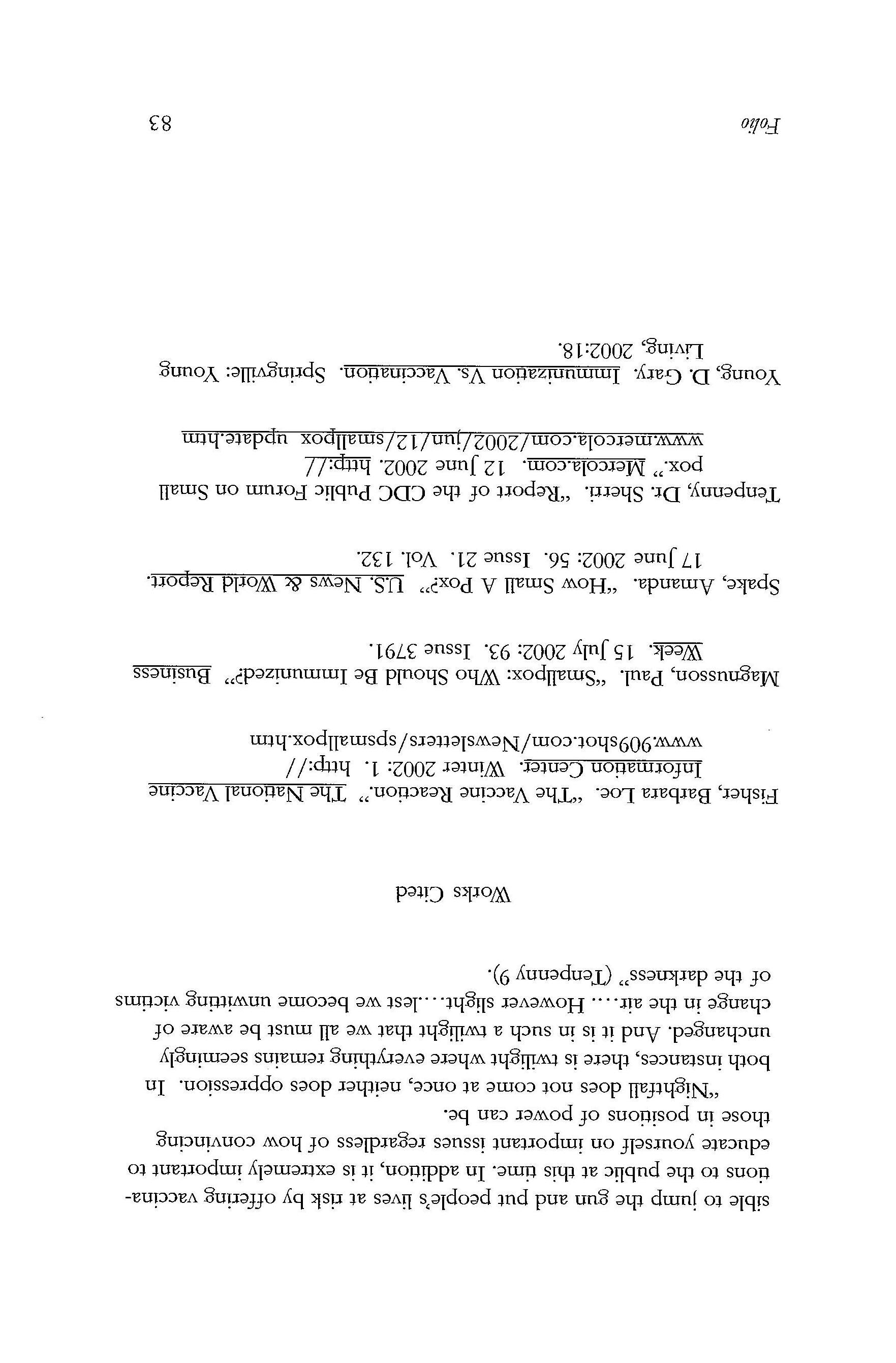
Fisher, Barbara Loe. "The Vaccine Reaction." The National Vaccine Information Center. Winter 2002: 1. http:// www.909shot.com/N ewsletters / spsmallpox.htm
Magnusson, Paul. "Smallpox: Who Should Be Immunized?" Business Week. 15 July 2002: 93. Issue 3791.
Spake, Amanda. "How Small A Pox?" U.S. News & World Report. 17 June 2002: 56. Issue 21. Vol. 132.
Tenpenny, Dr. Sherri. "Report of the CDC Public Forum on Small pox." Mercola.com. 12 June 2002. http:// www.mercola.com/2002/jun/12/smallpox update.htm
Young, D. Gary. Immunization Vs. Vaccination. Springville: Young Living, 2002: 18.
Folio 83
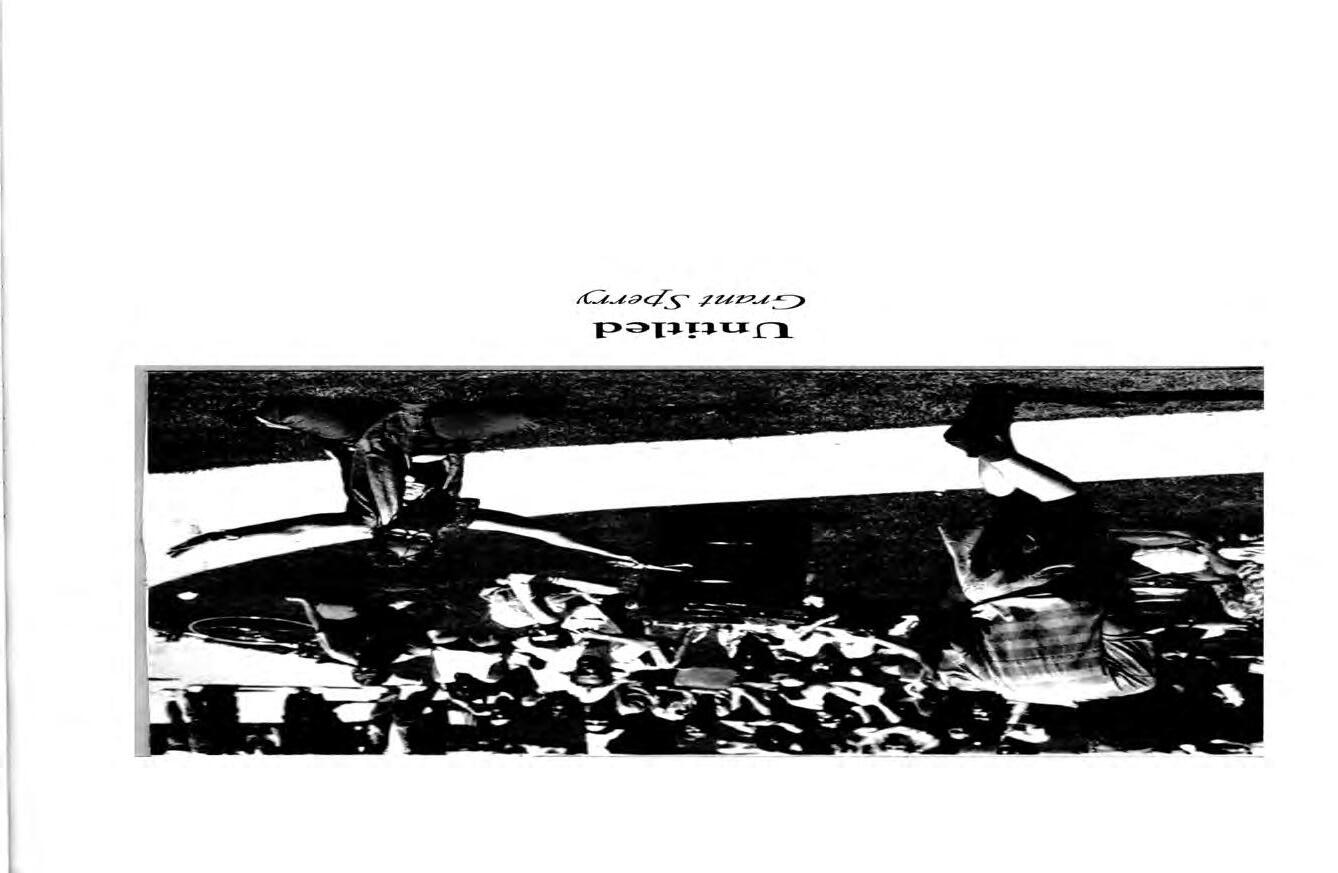
For the Dreamer

No man ever made a great discovery without the excercise of the imagination.
-George Henry Lewes
Starry Night
Aimee O'Brien
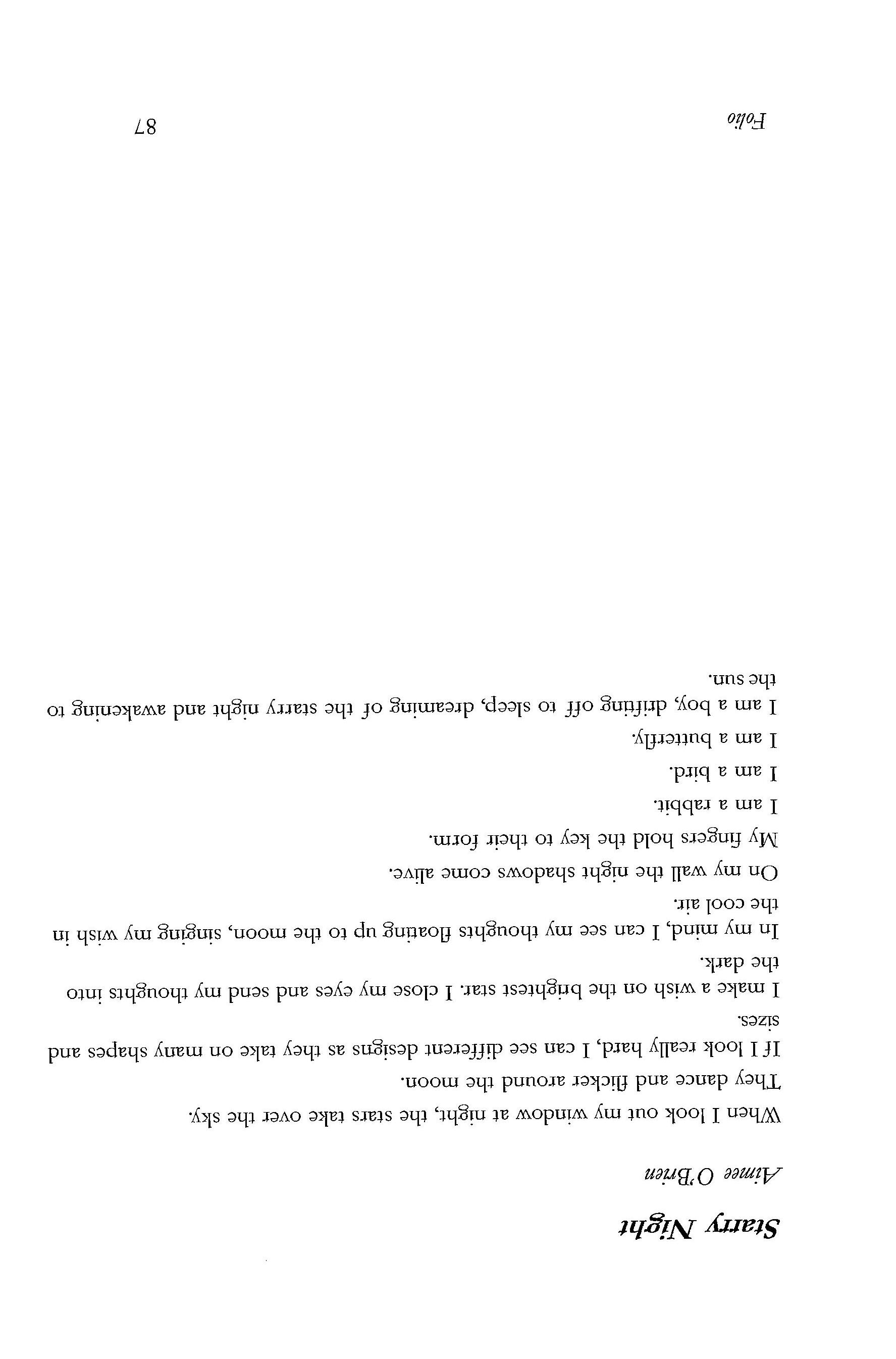
When I look out my window at night, the stars take over the sky.
They dance and flicker around the moon.
If I look really hard, I can see different designs as they take on many shapes and sizes.
I make a wish on the brightest star. I close my eyes and send my thoughts into the dark.
In my mind, I can see my thoughts floating up to the moon, singing my wish in the cool air.
On my wall the night shadows come alive.
My fingers hold the key to their form.
I am a rabbit.
I am a bird.
I am a butterfly.
I am a boy, drifting off to sleep, dreaming of the starry night and awakening to the sun.
87
Folio
Garden Walk
Mark Curtis
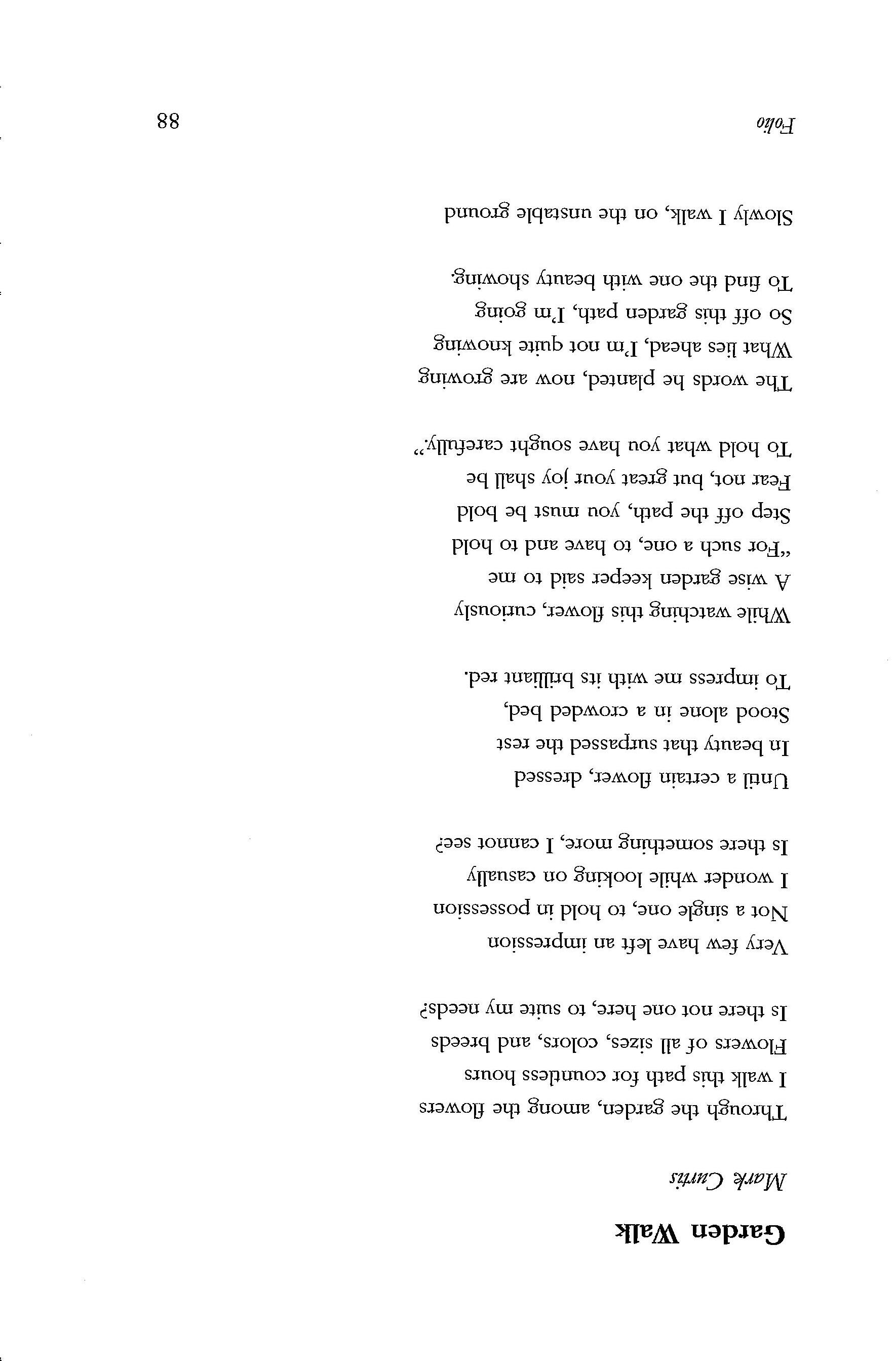
Through the garden, among the flowers
I walk this path for countless hours
Flowers of all sizes, colors, and breeds
Is there not one here, to suite my needs?
Very few have left an impression
Not a single one, to hold in possession
I wonder while looking on casually
Is there something more, I cannot see?
Until a certain flower, dressed
In beauty that surpassed the rest
Stood alone in a crowded bed,
To impress me with its brilliant red.
While watching this flower, curiously
A wise garden keeper said to me
"For such a one, to have and to hold
Step off the path, you must be bold
Fear not, but great your joy shall be
To hold what you have sought carefully."
The words he planted, now are growing
What lies ahead, I'm not quite knowing
So off this garden path, I'm going
To find the one with beauty showing.
Slowly I walk, on the unstable ground
88
Folio

Stop and crouch, while looking down
I pick as I reach for the garden floor, Arise, and stand taller than ever before
This flower in hand, I gain a surprise
There's much more to it, than meets the eyes
A soft, smooth touch and a pleasant smell
And many other things, the eye can't tell
So I ask the man, who knows all flowers, And created them with his endless powers
"Why was this flower all alone?
And standing where the sunlight shone?"
Regarding the flower, of my choice
He spoke to me, in a still small voice
"If it hadn't been, you'd pass it by It stands alone, for this reason why-
When it rains, this one will wade
Not hiding in a place of shade
Firmly knowing, on that same day
That the sun can take the rain away
The sun has made this flower grow
You asked of me, and now you know, Its beauty shows, with colors bright Because, my son, it loves the light."
Folio 89
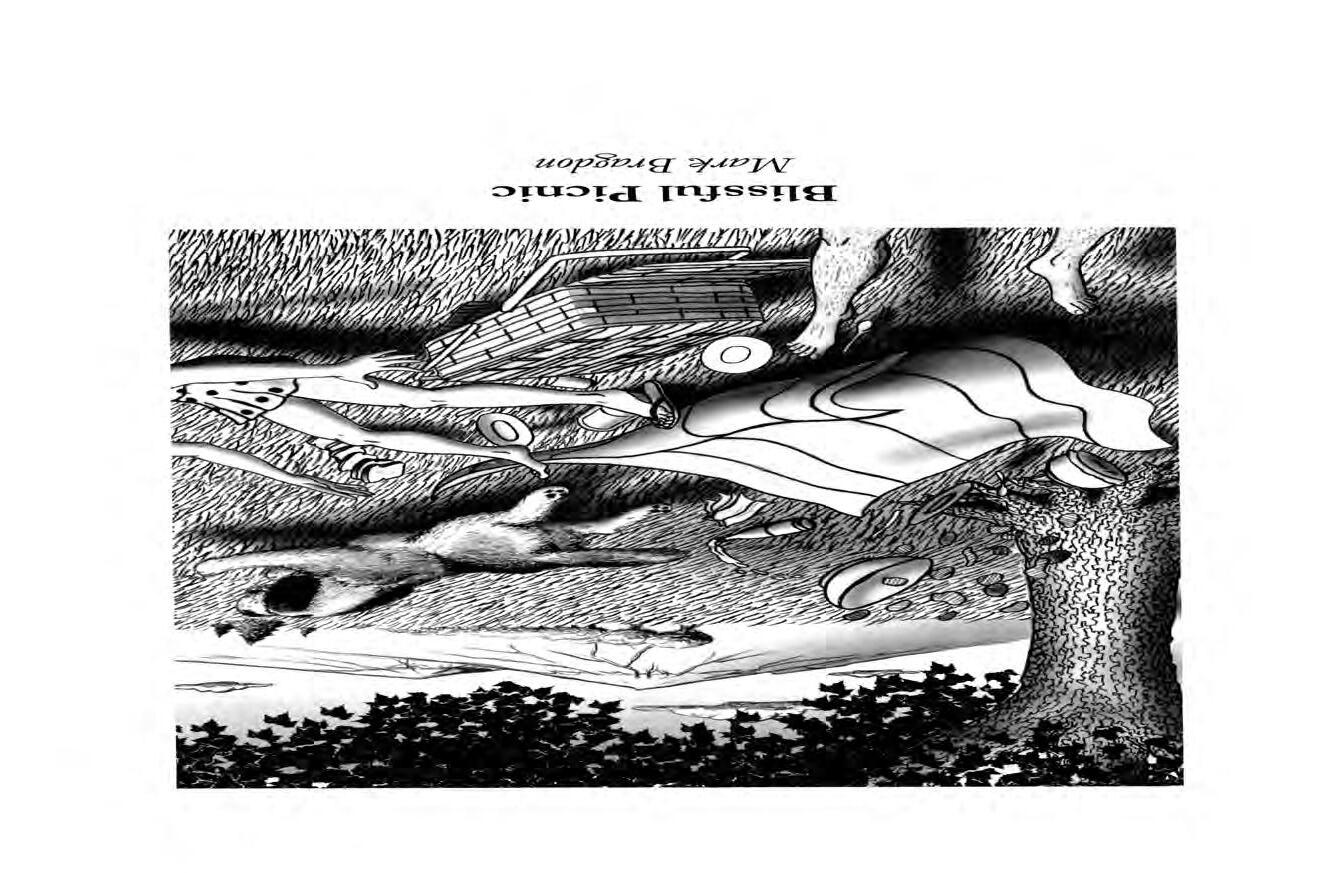
Learn by Heart
S tifanie Cosman
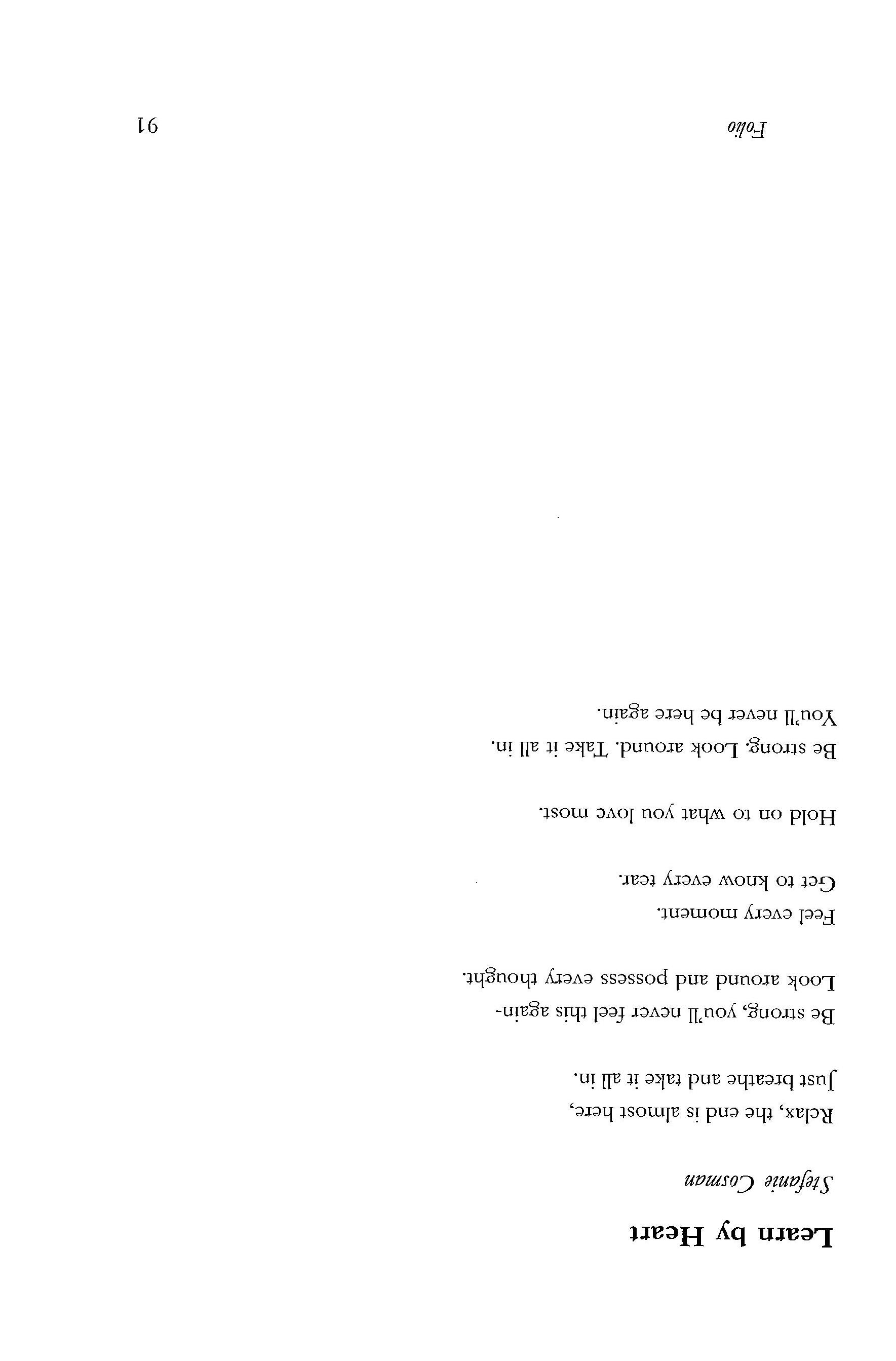
Relax, the end is almost here, Just breathe and take it all in.
Be strong, you'll never feel this againLook around and possess every thought.
Feel every moment. Get to know every tear.
Hold on to what you love most.
Be strong. Look around. Take it all in. You'll never be here again.
Folio 91
